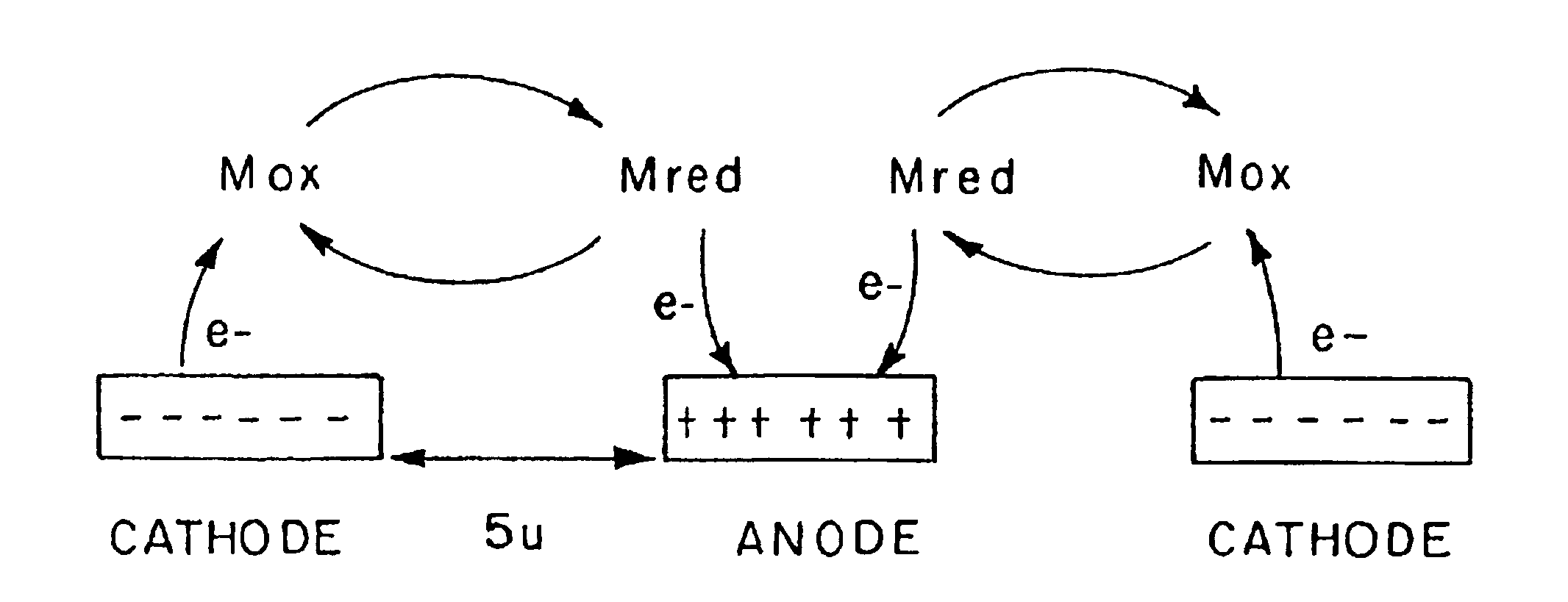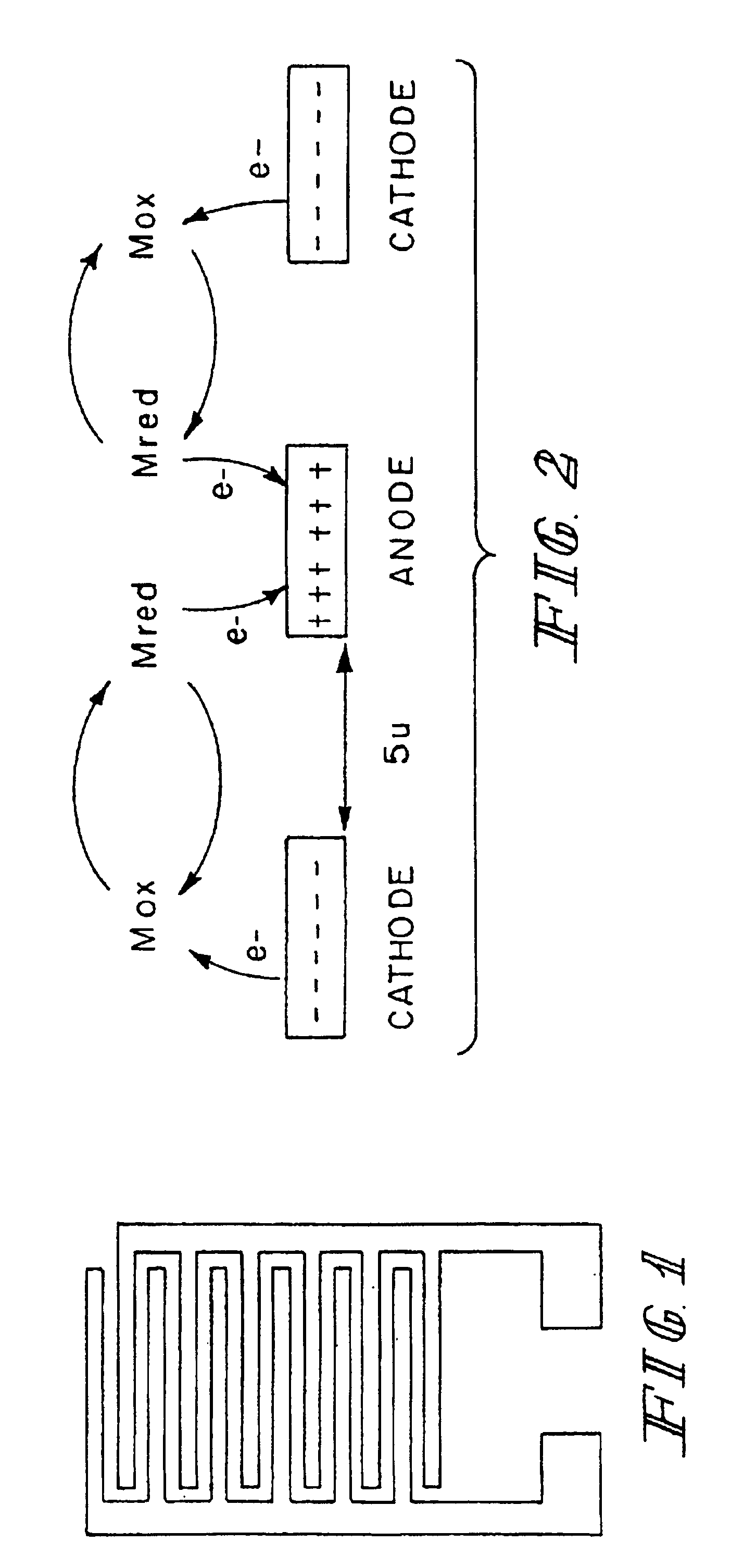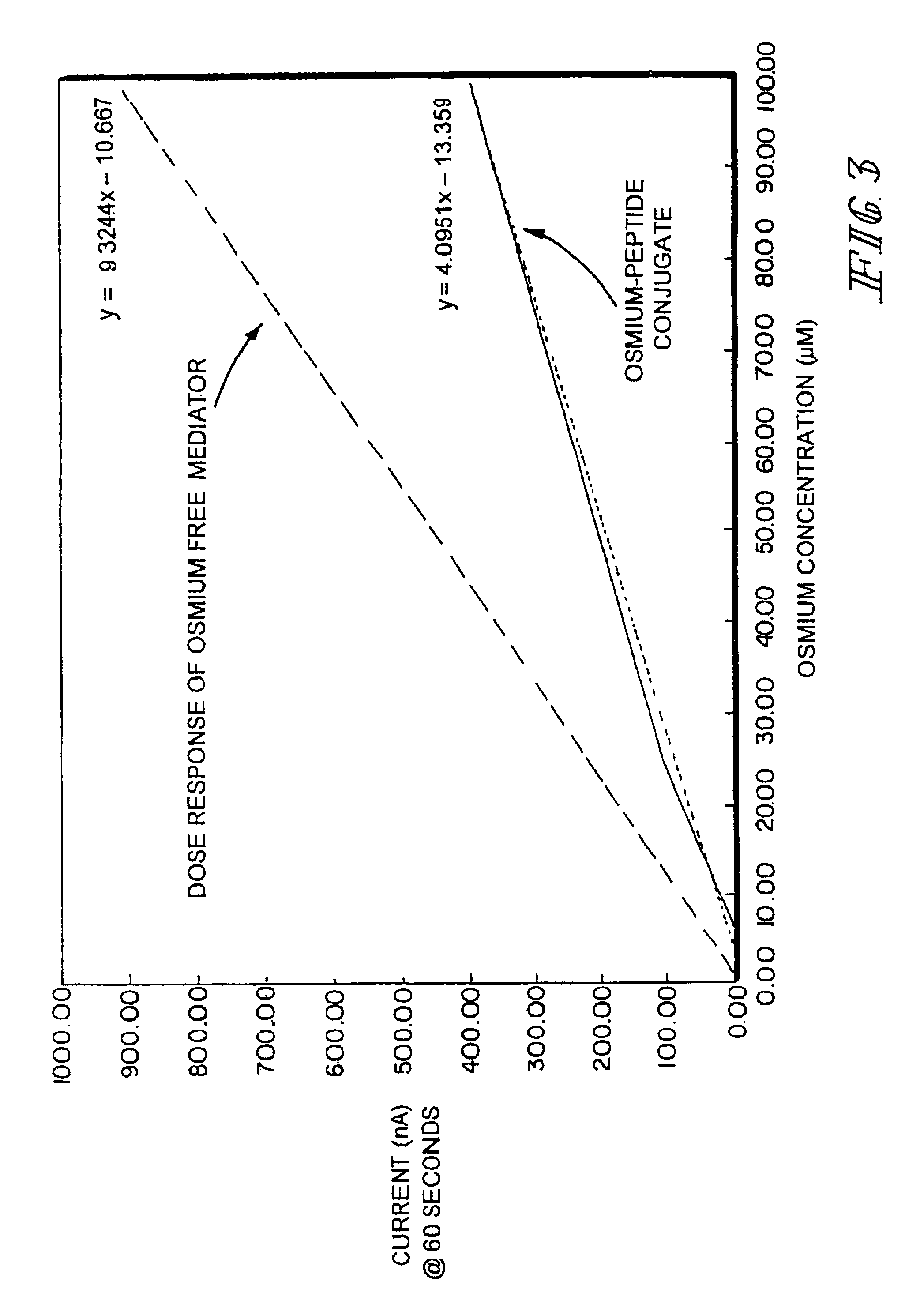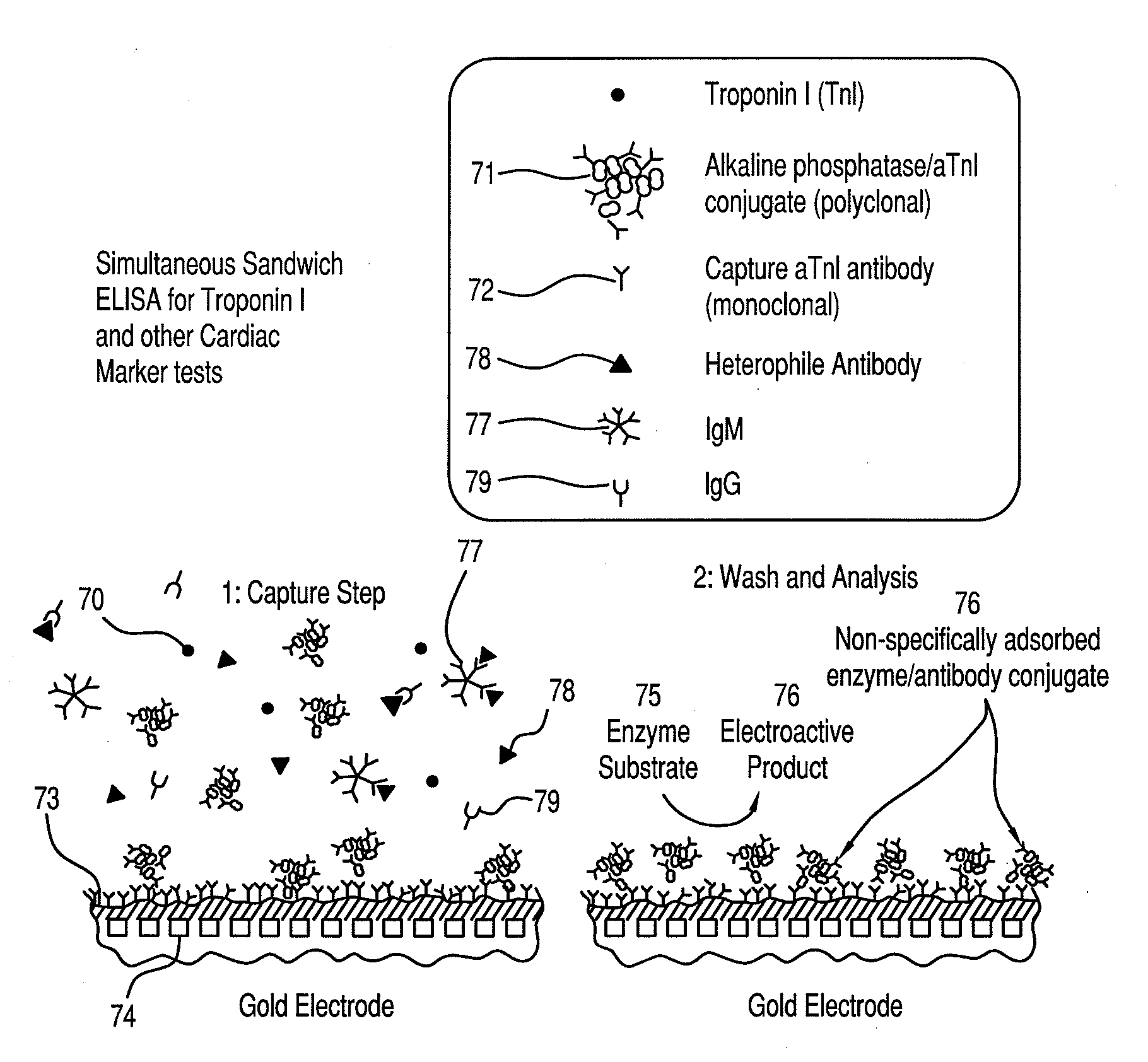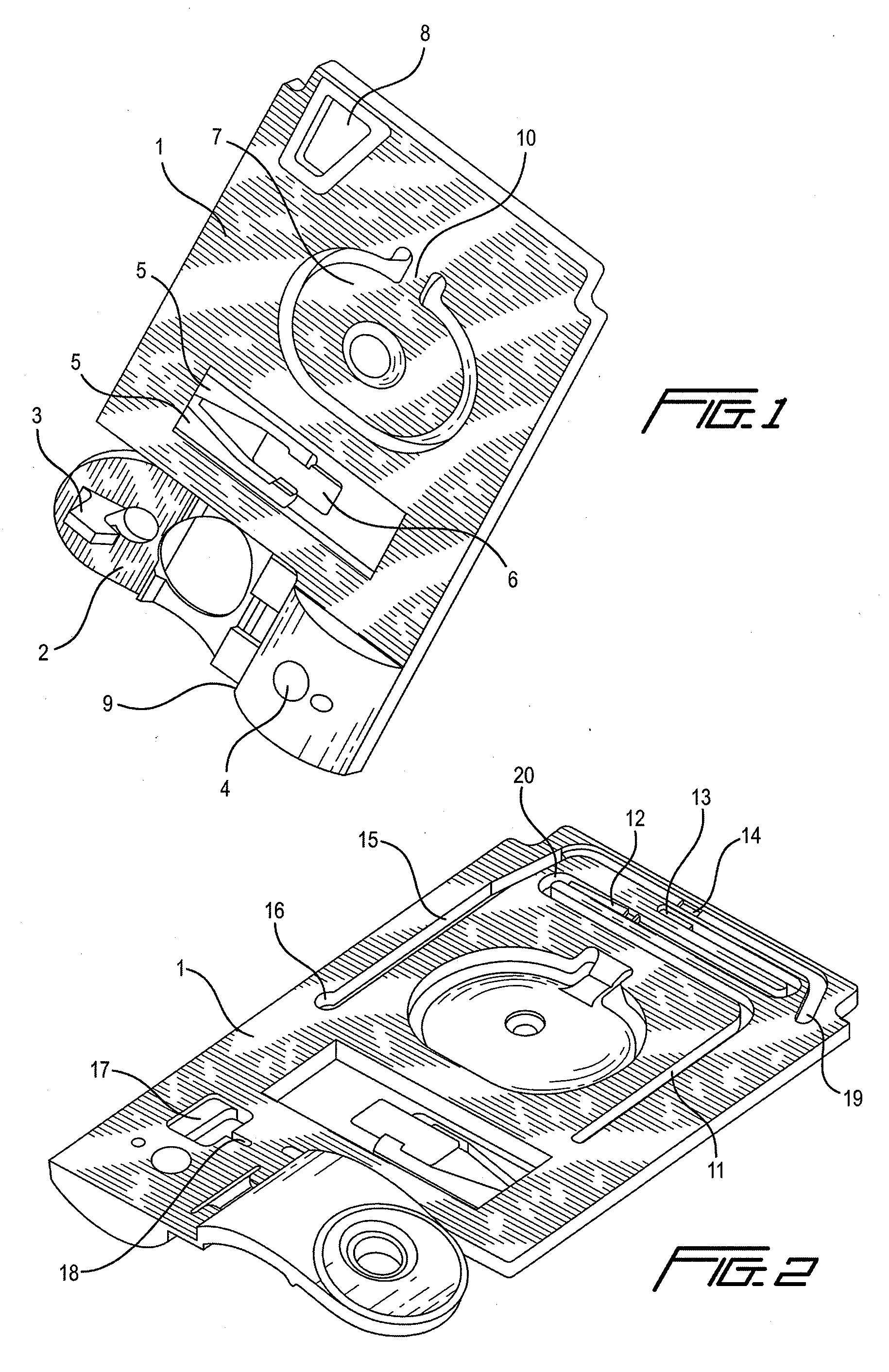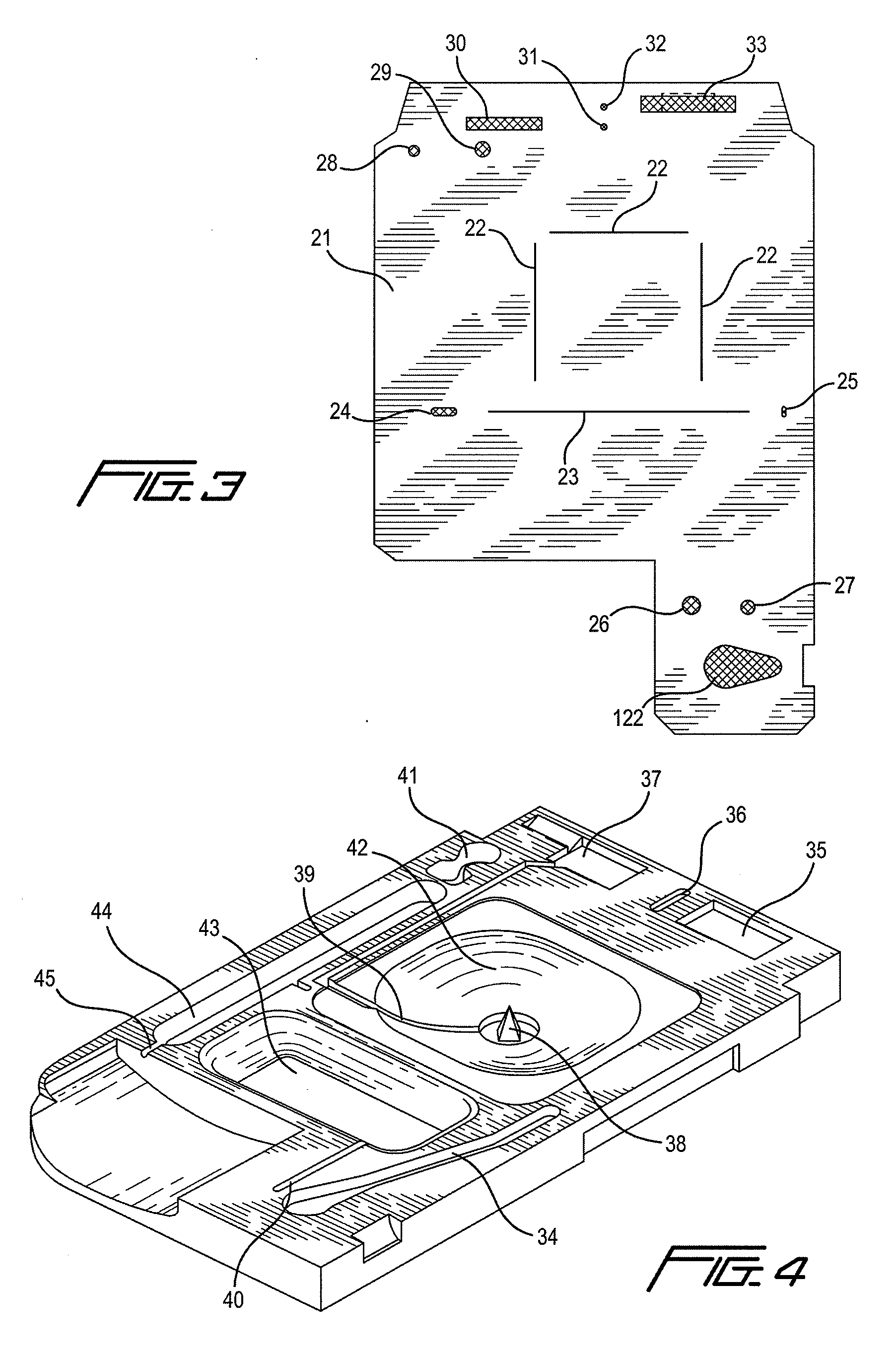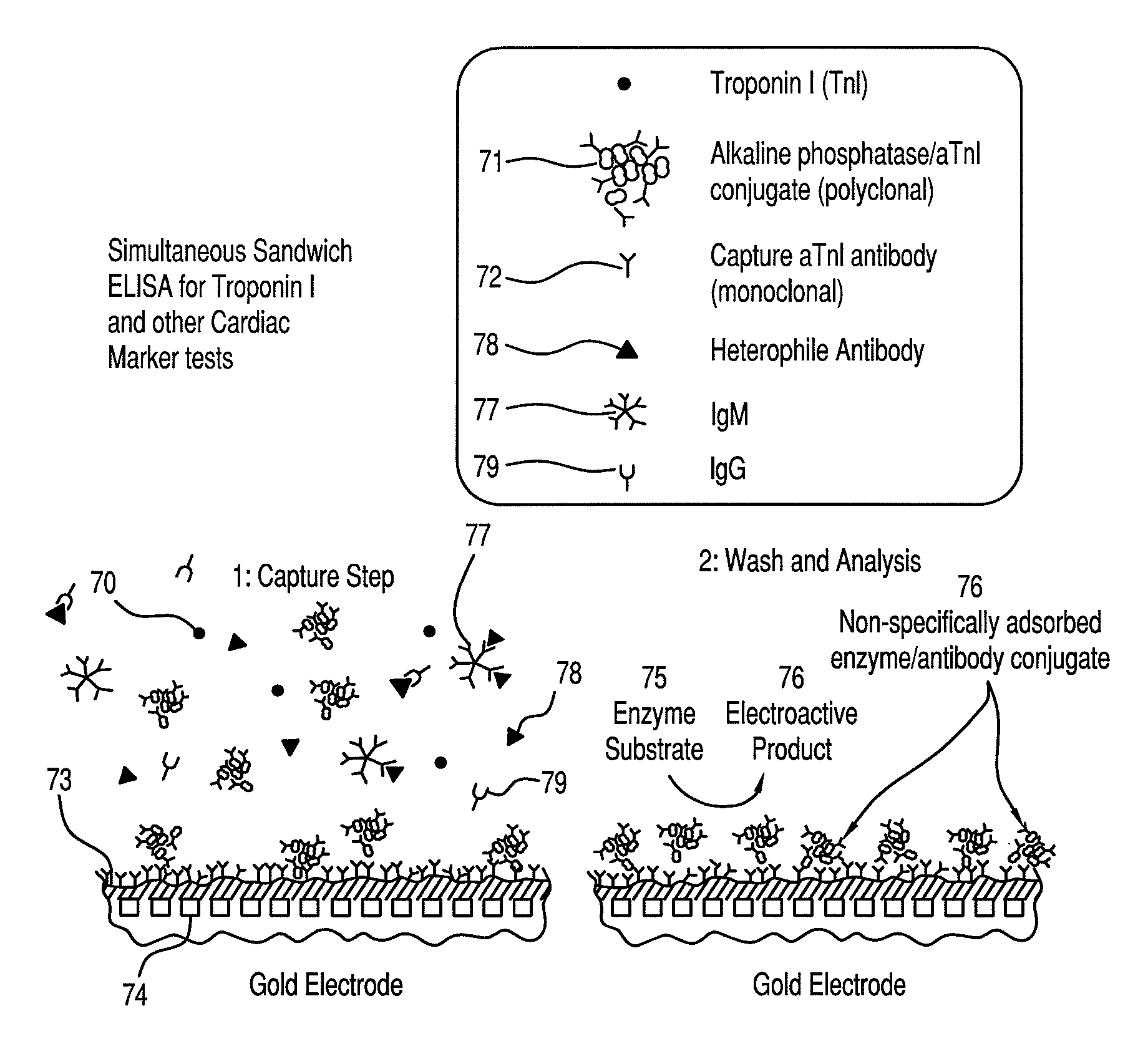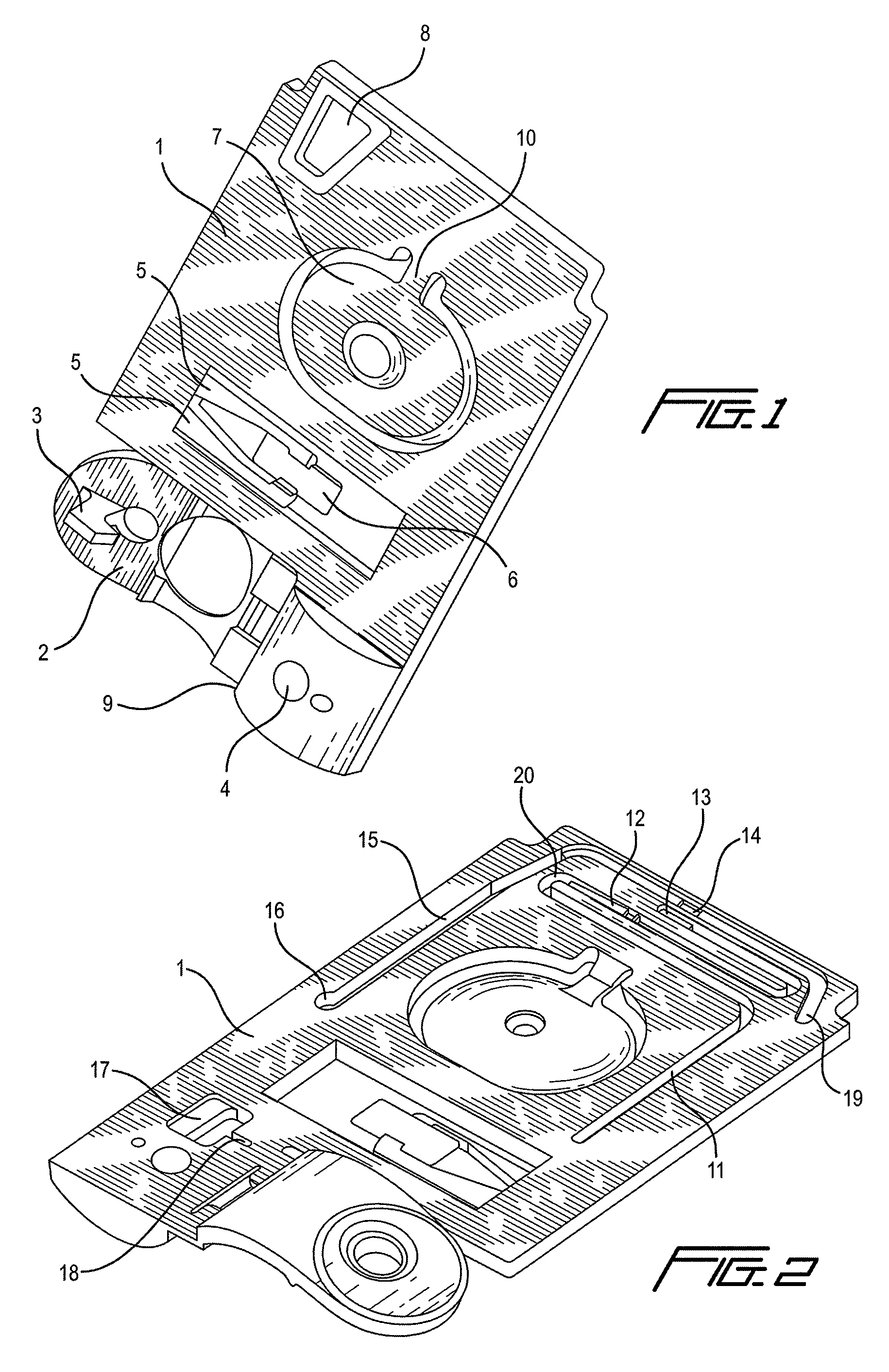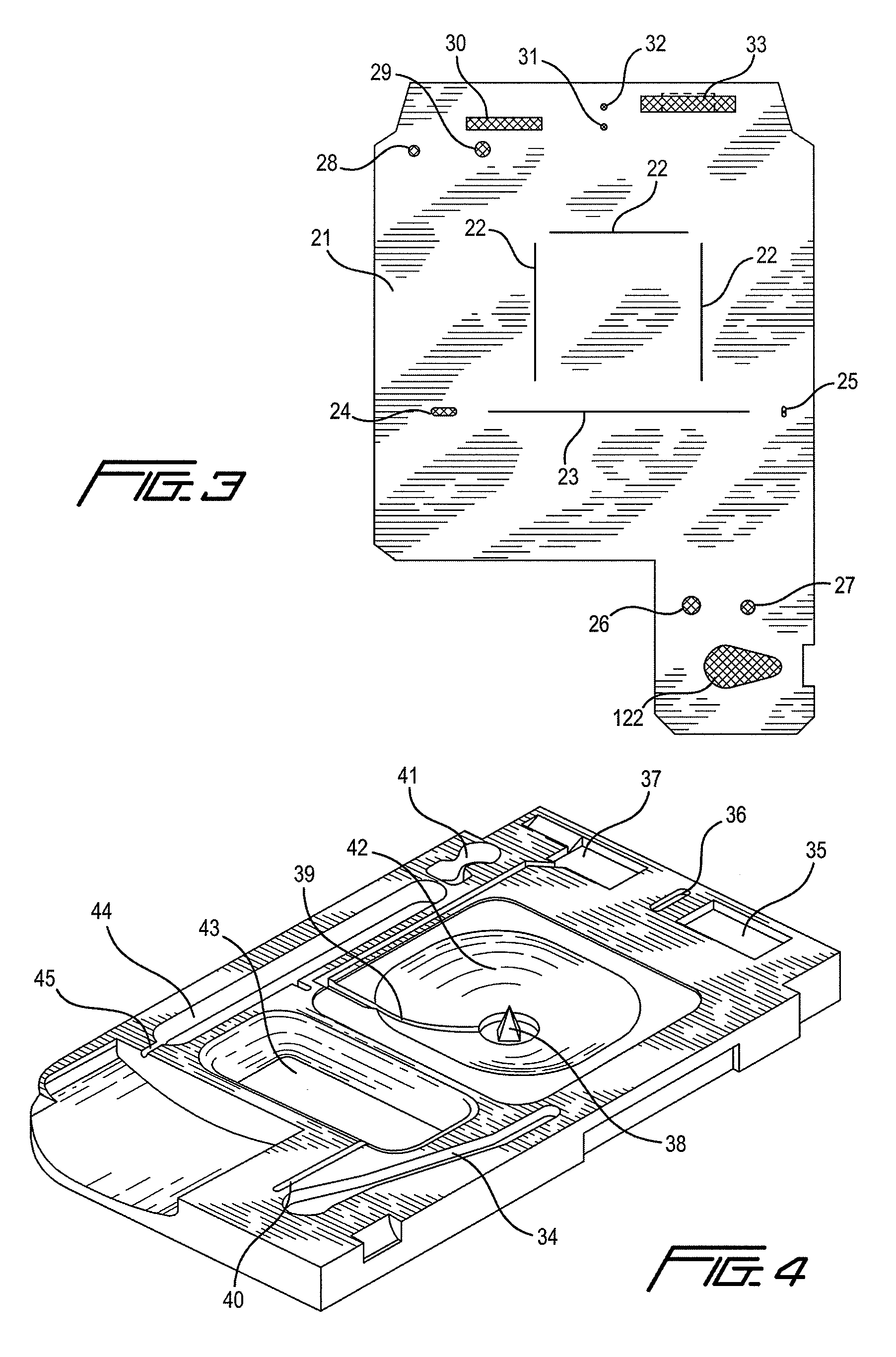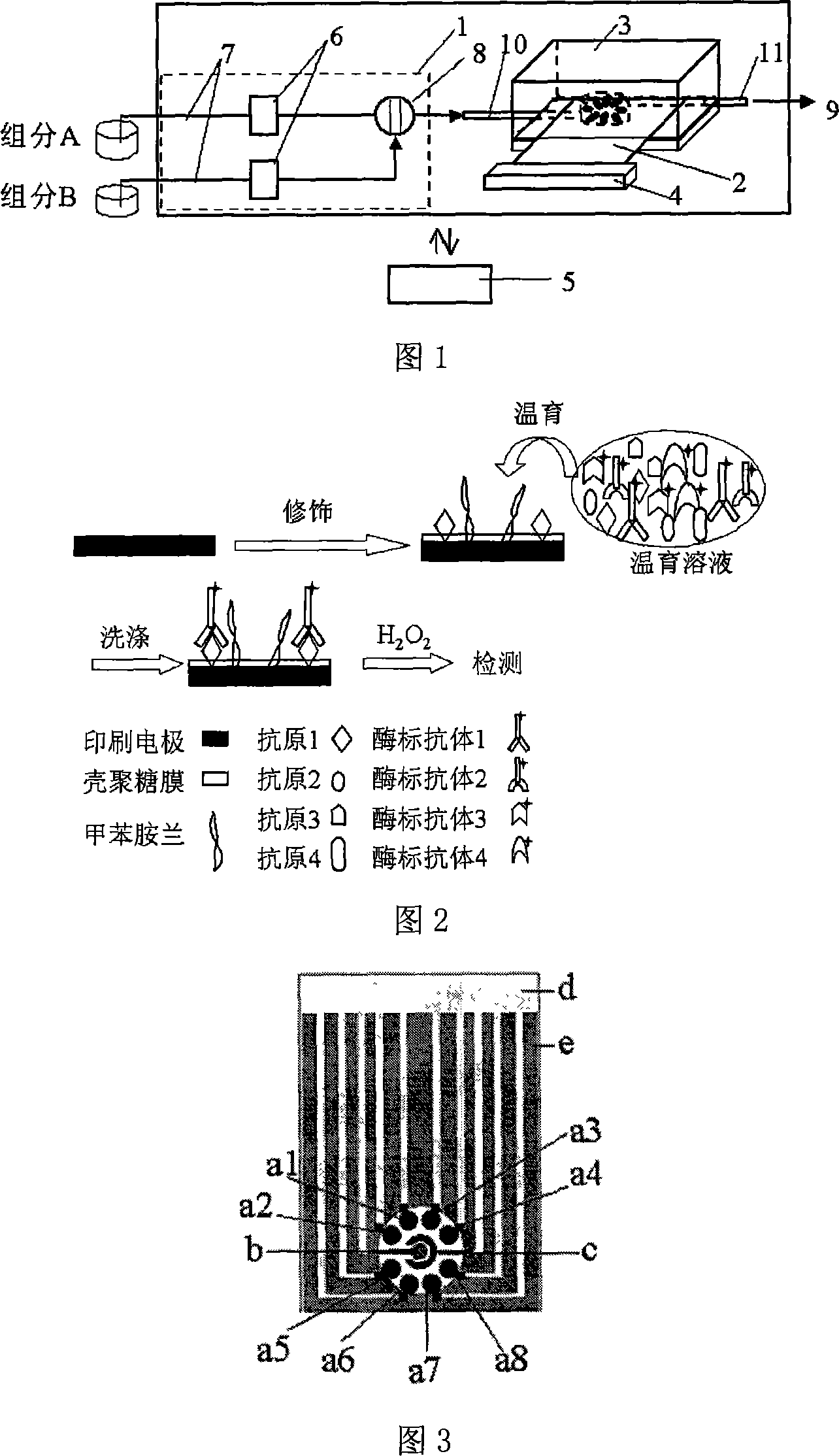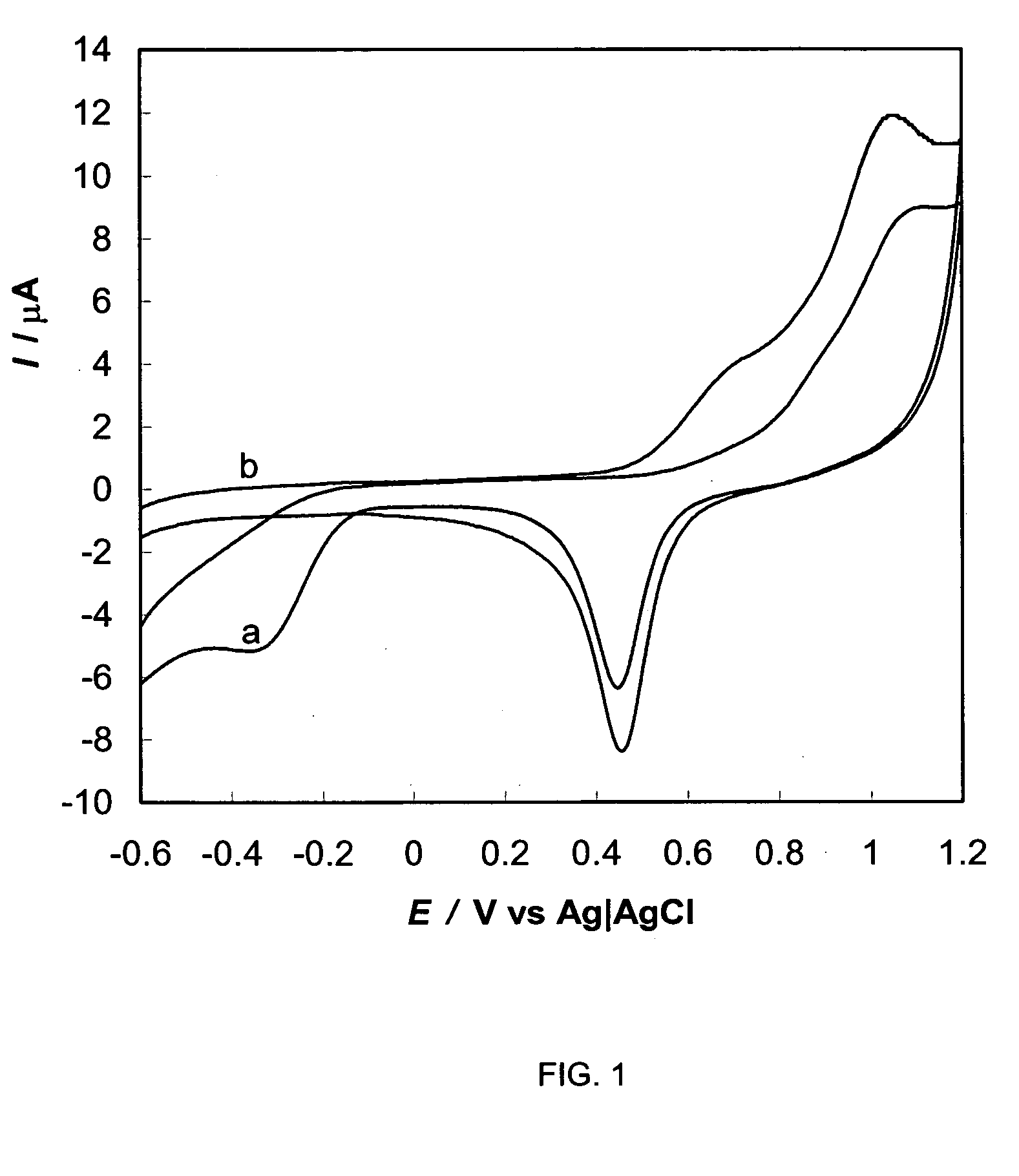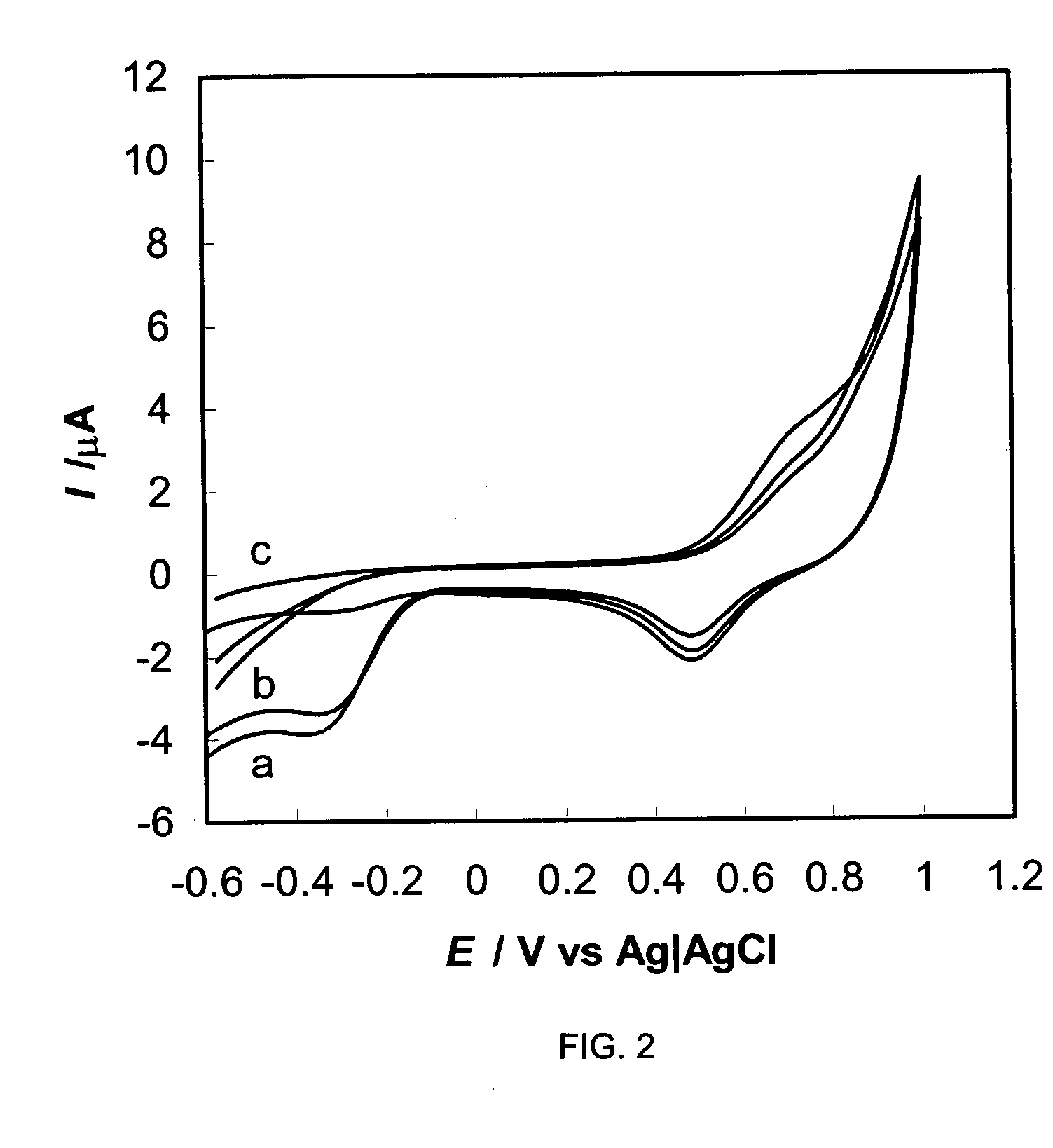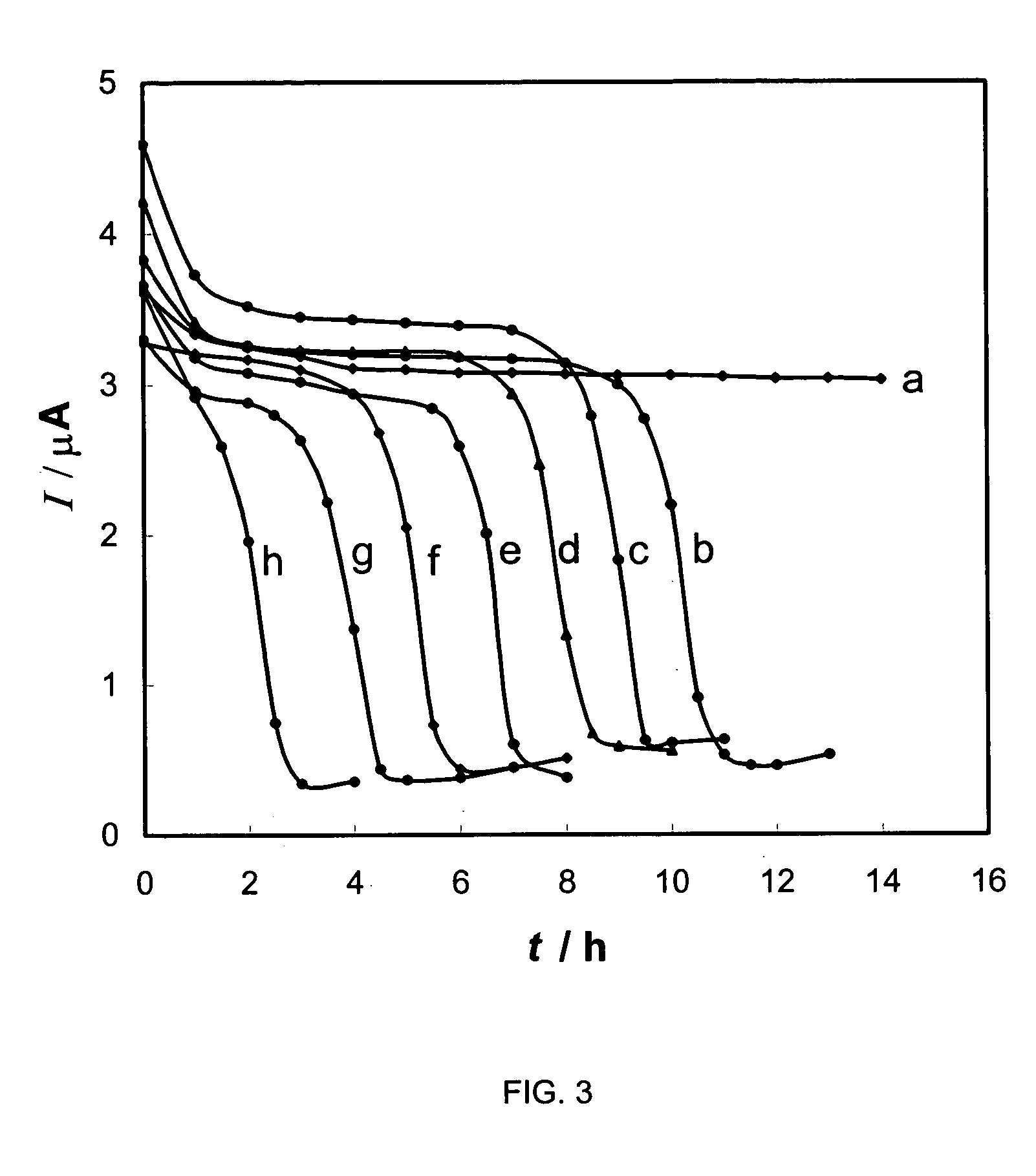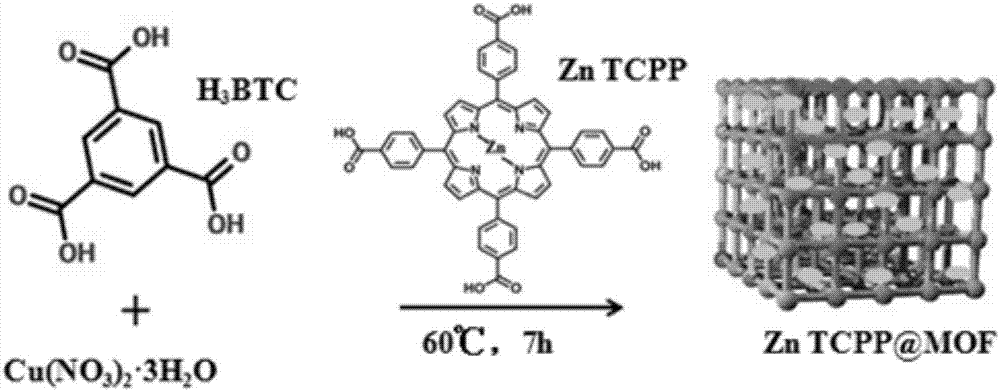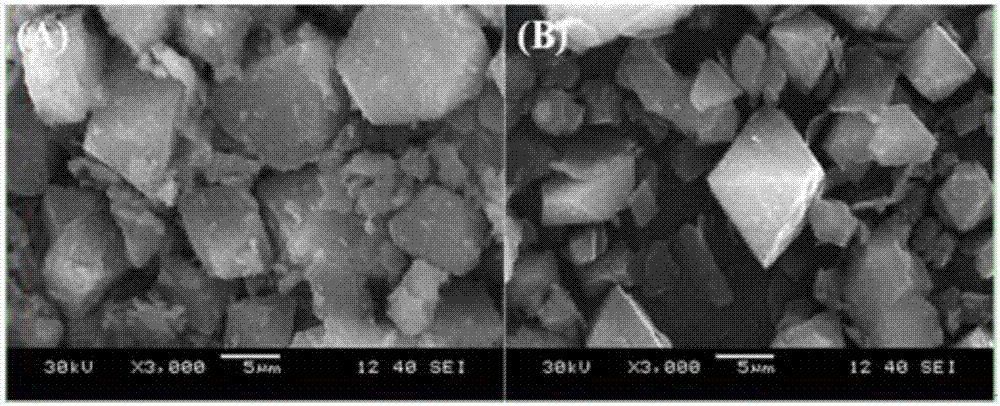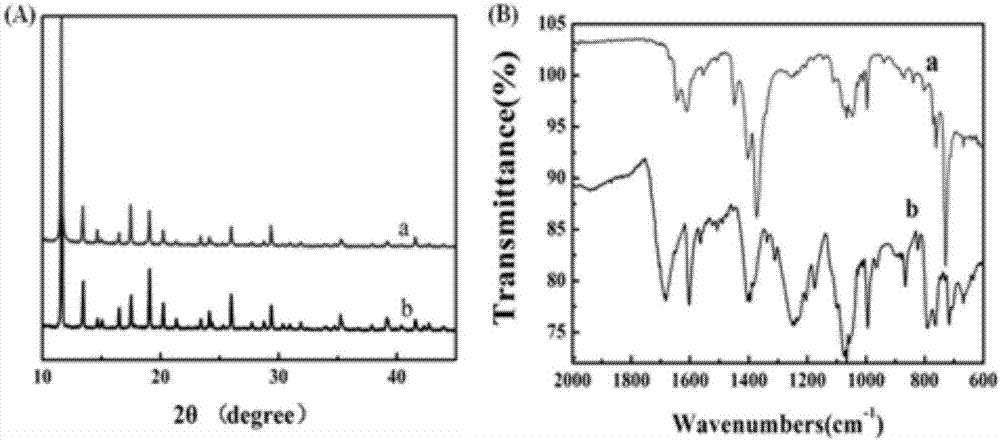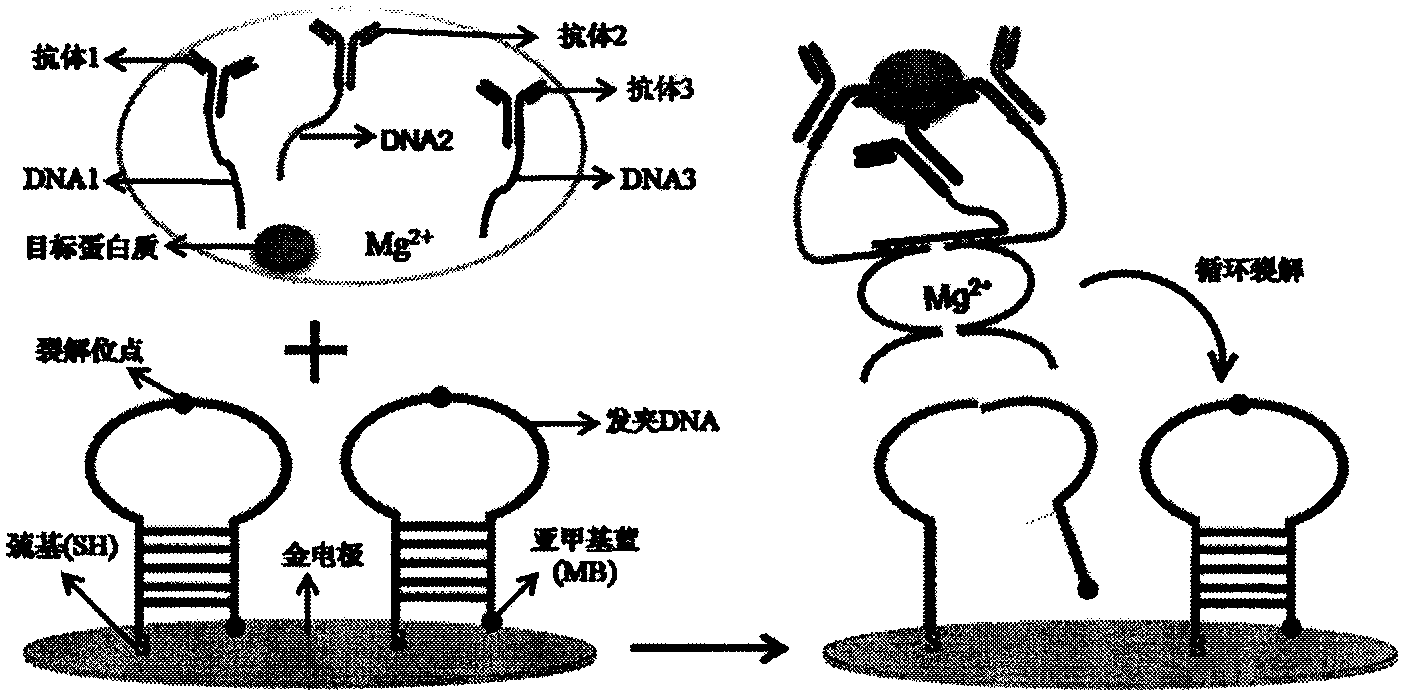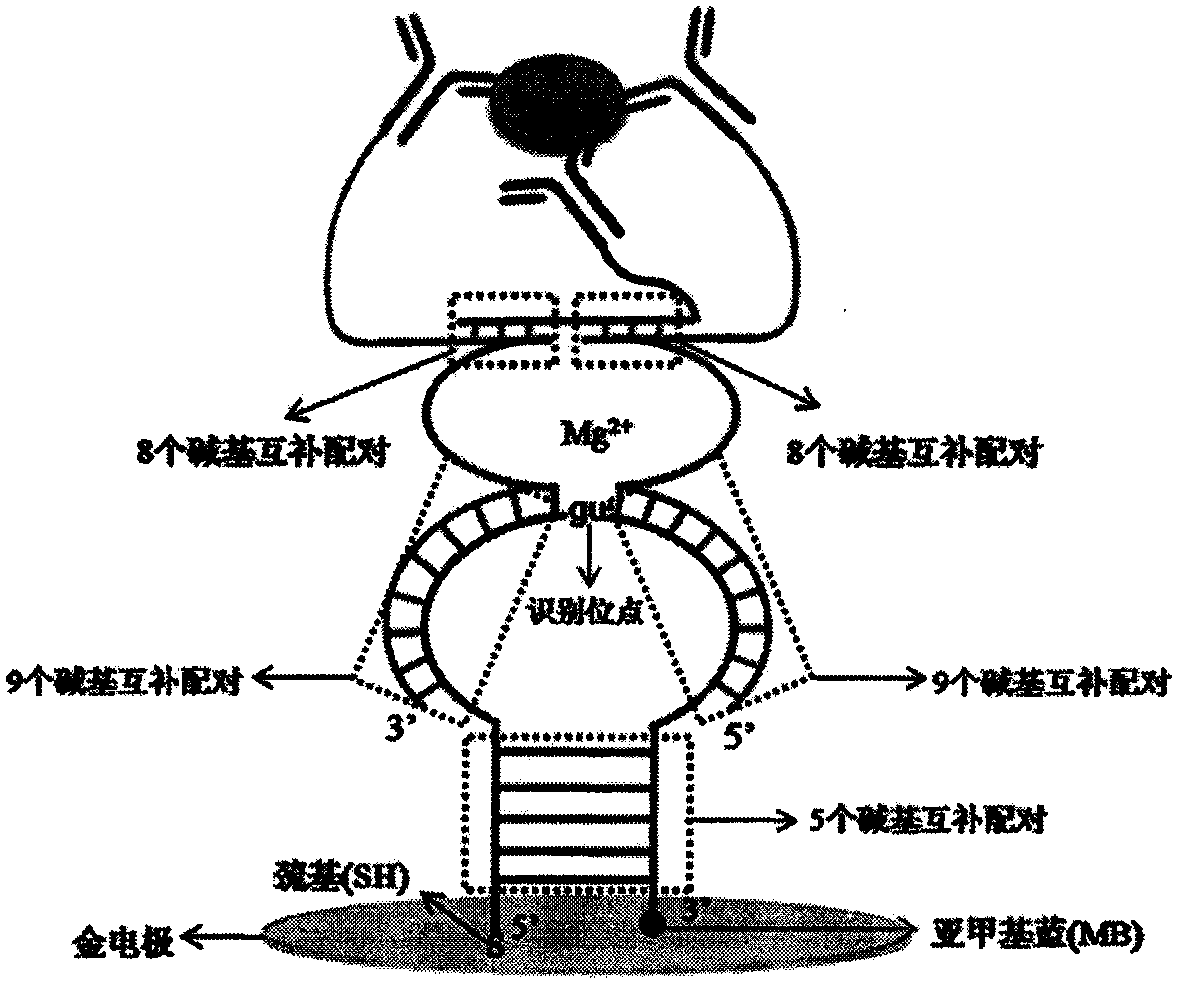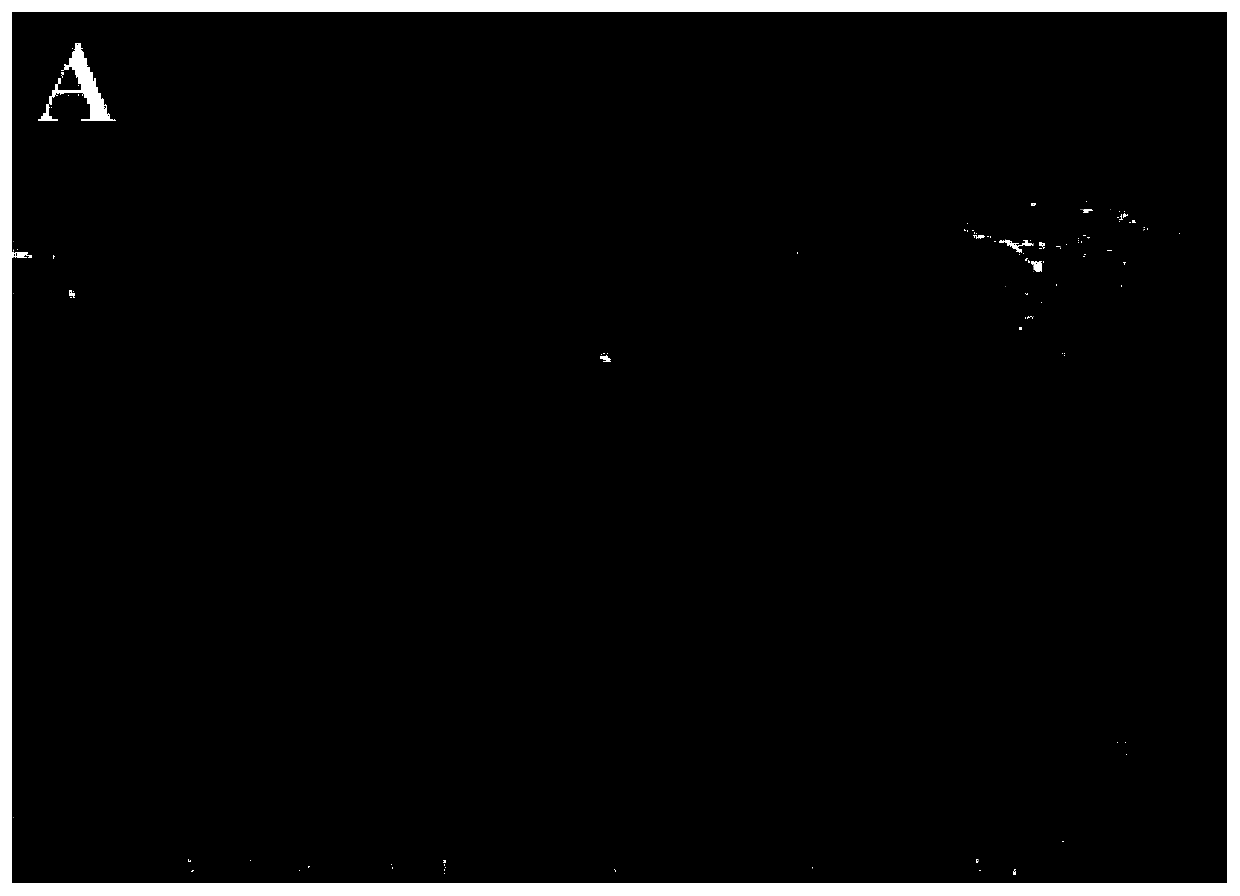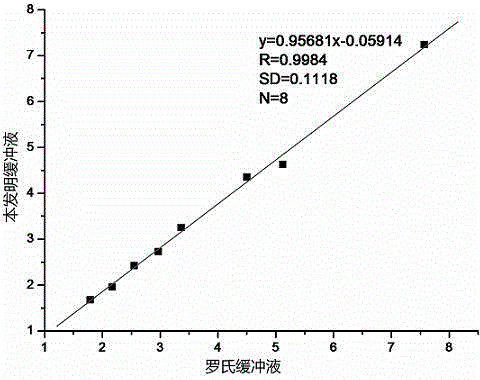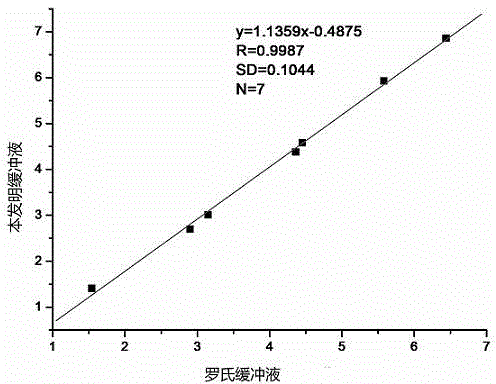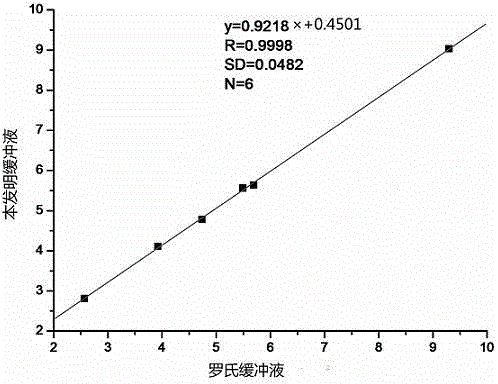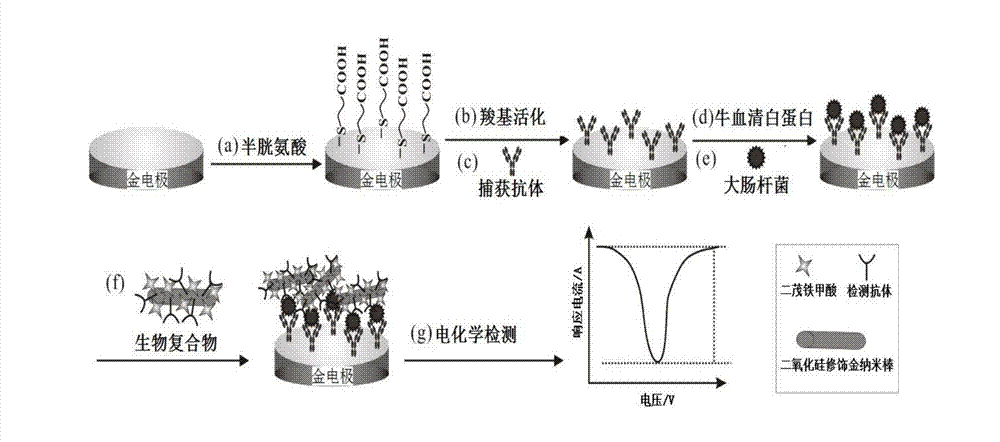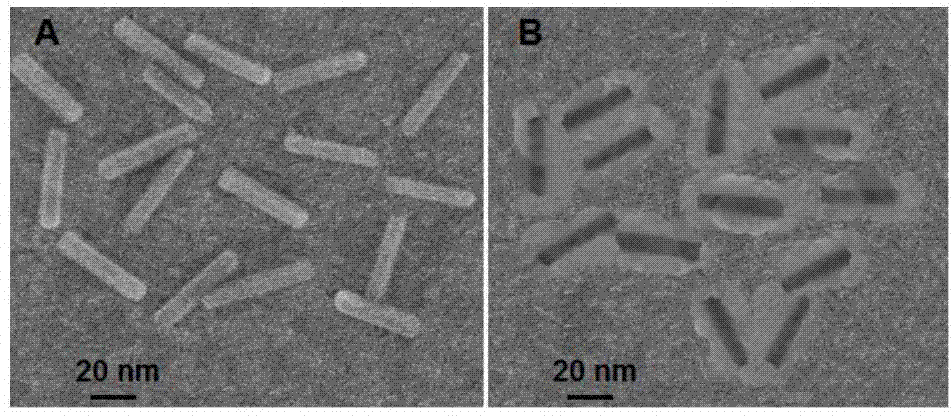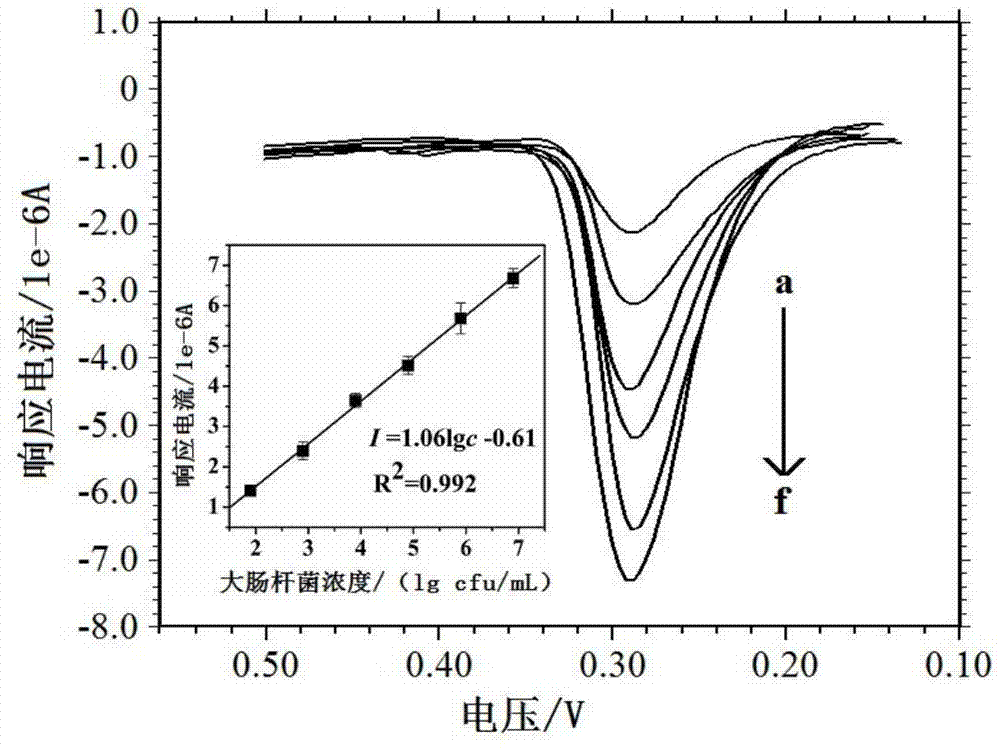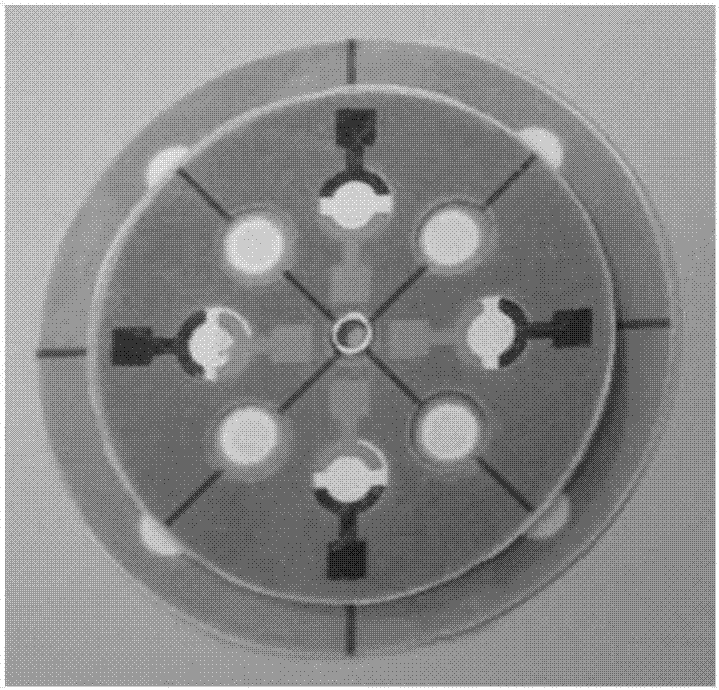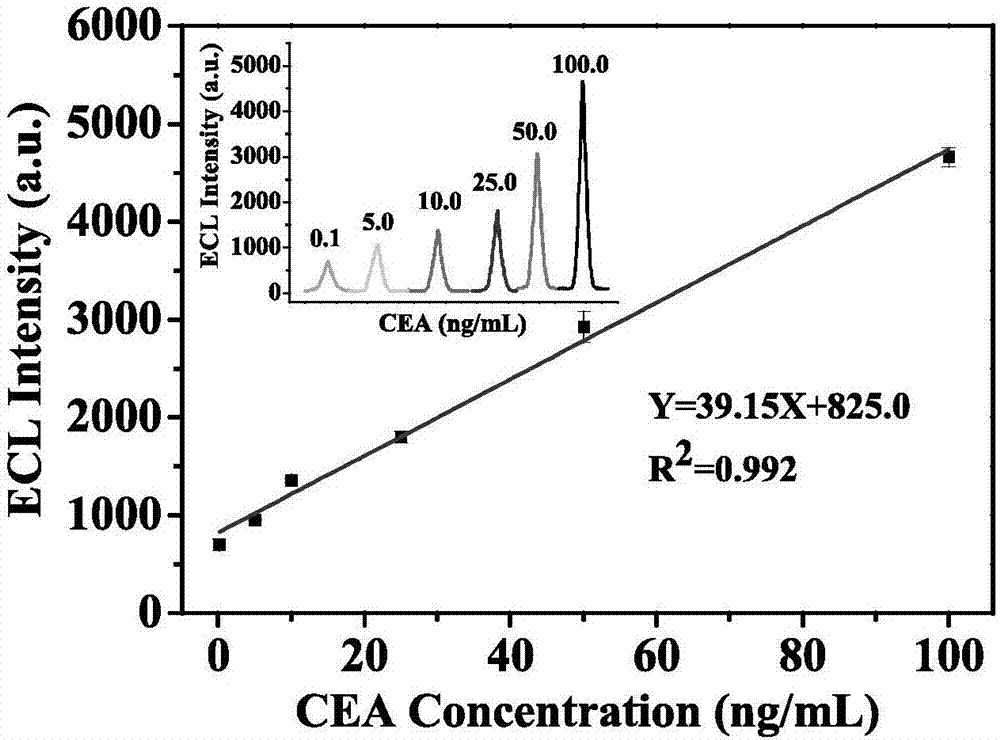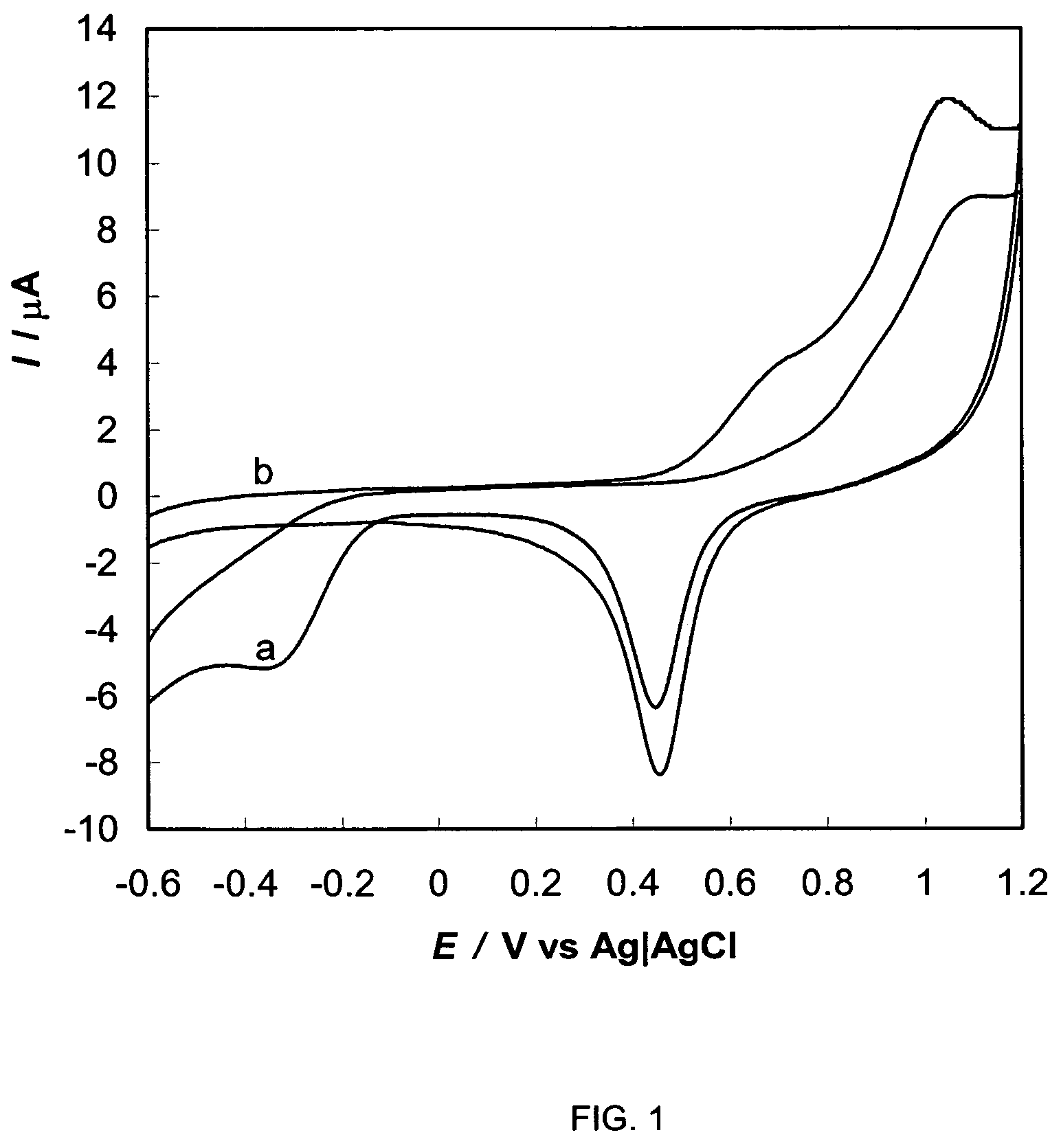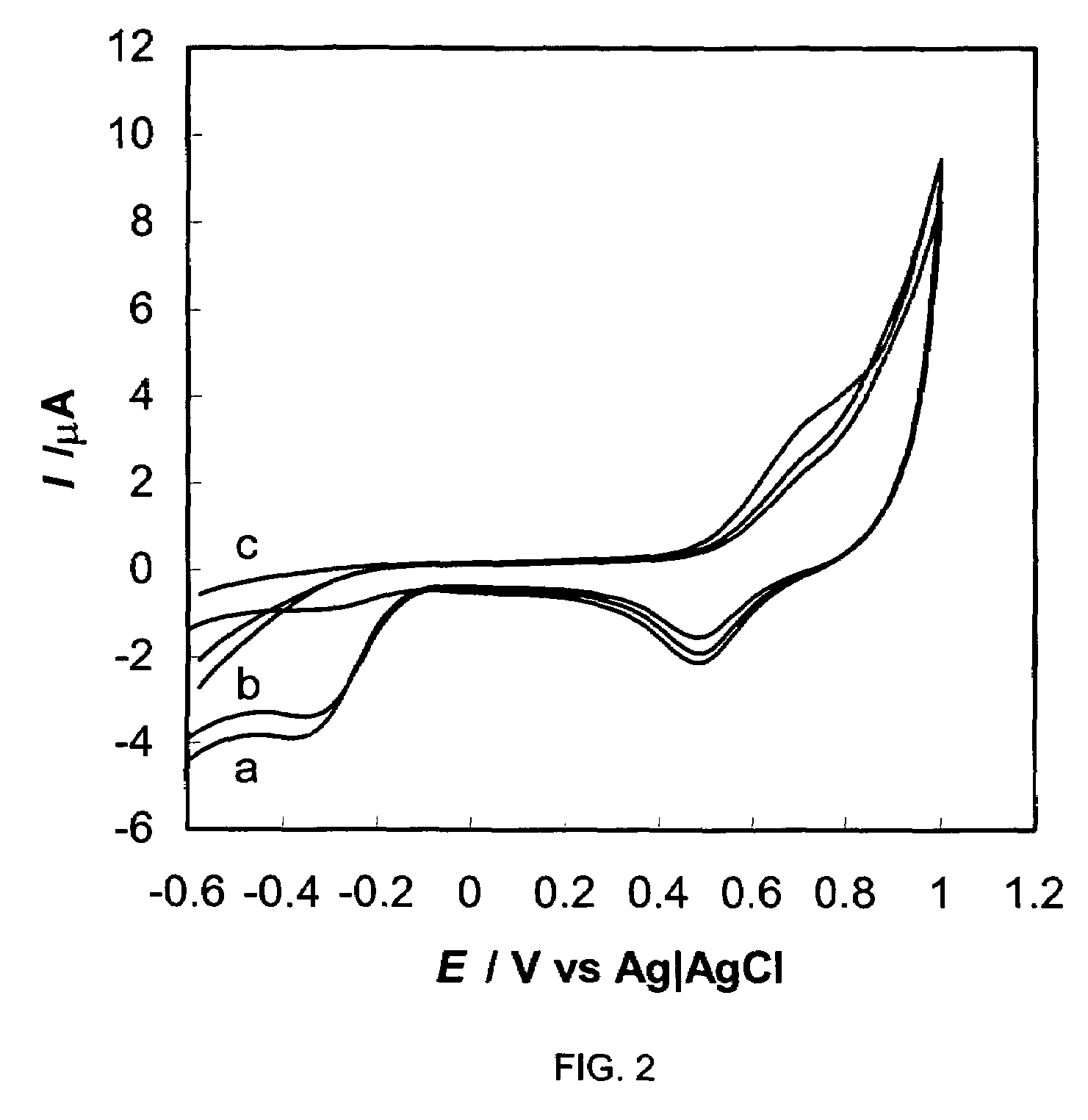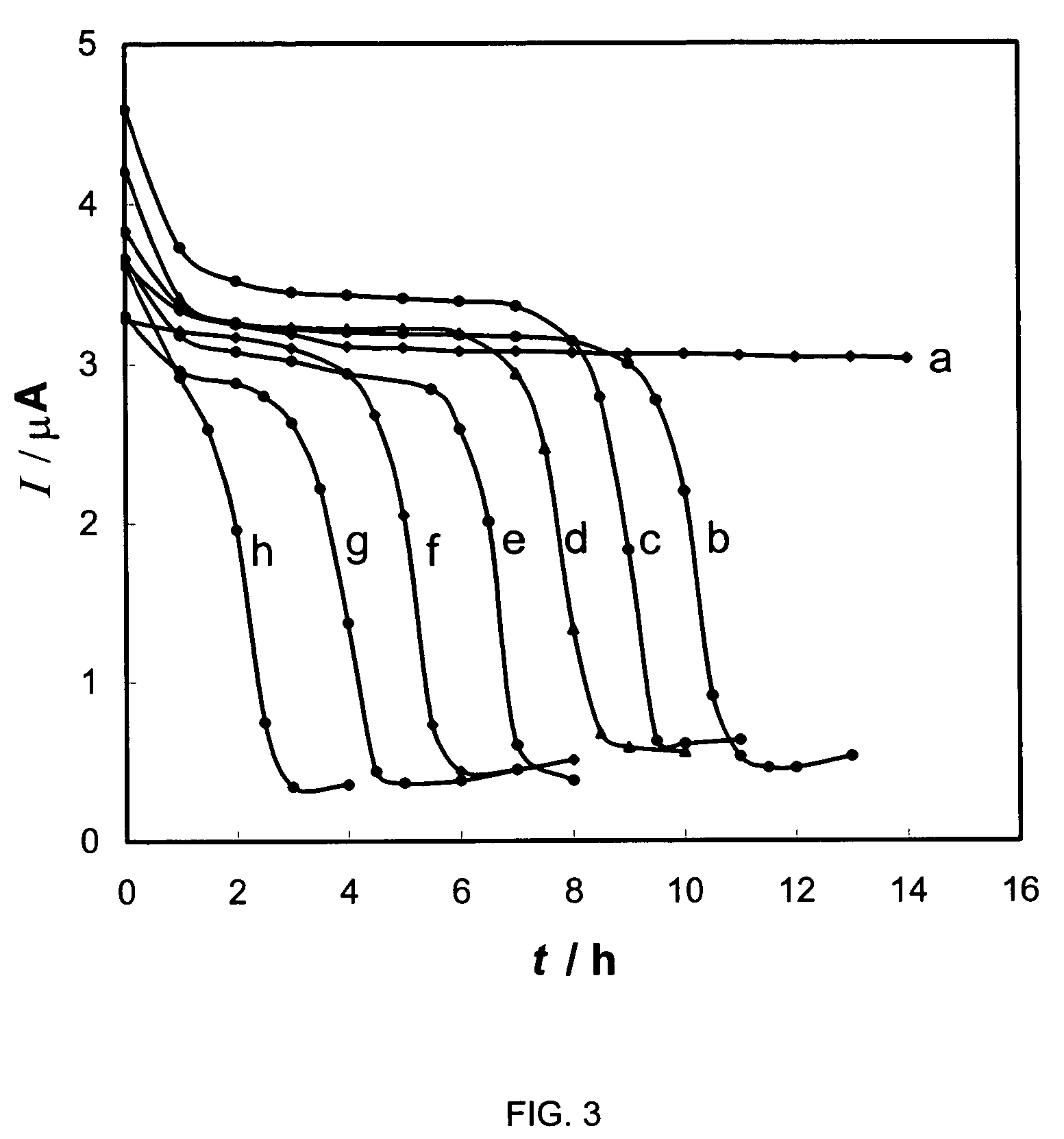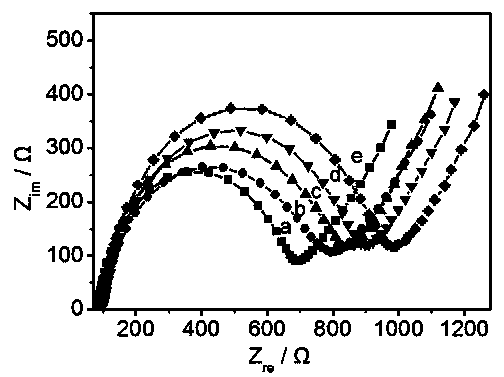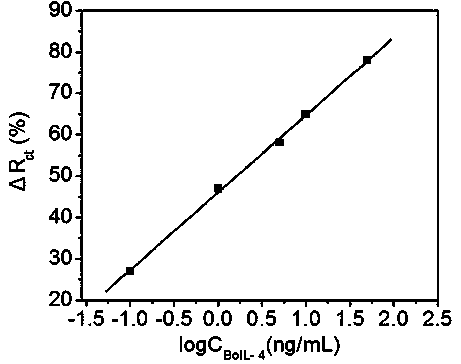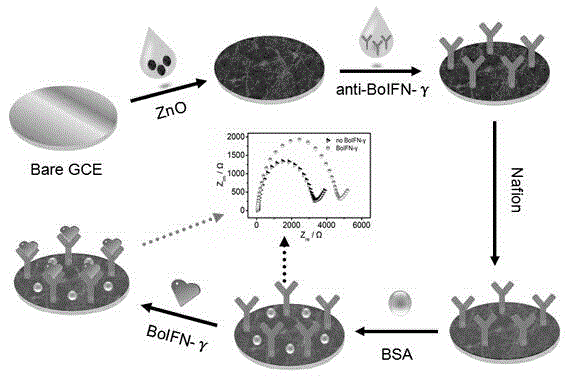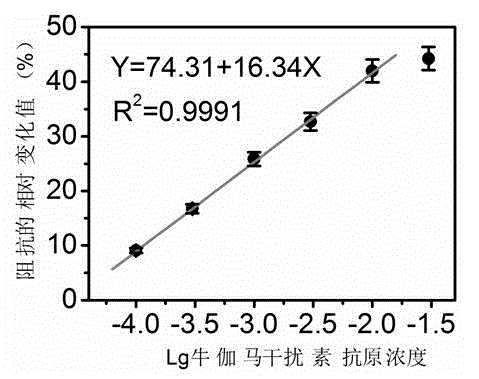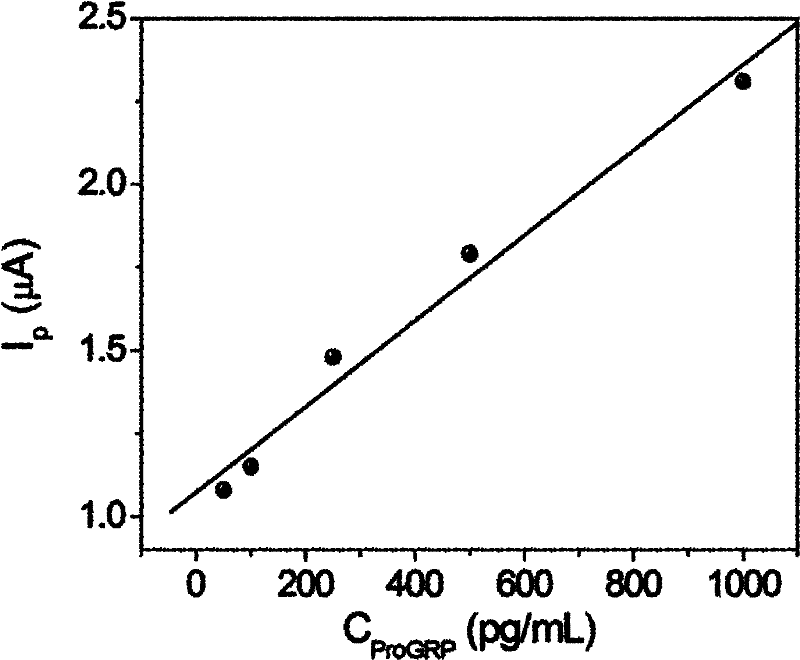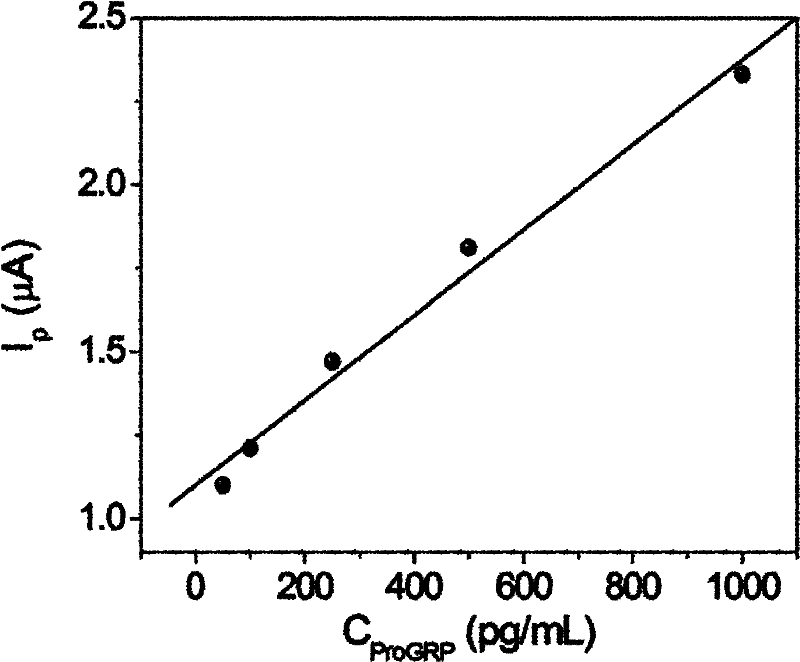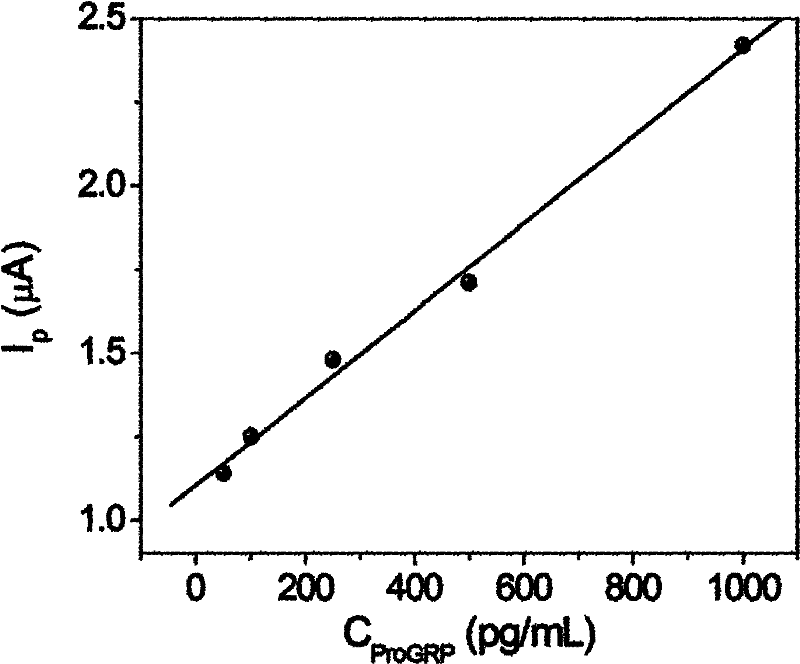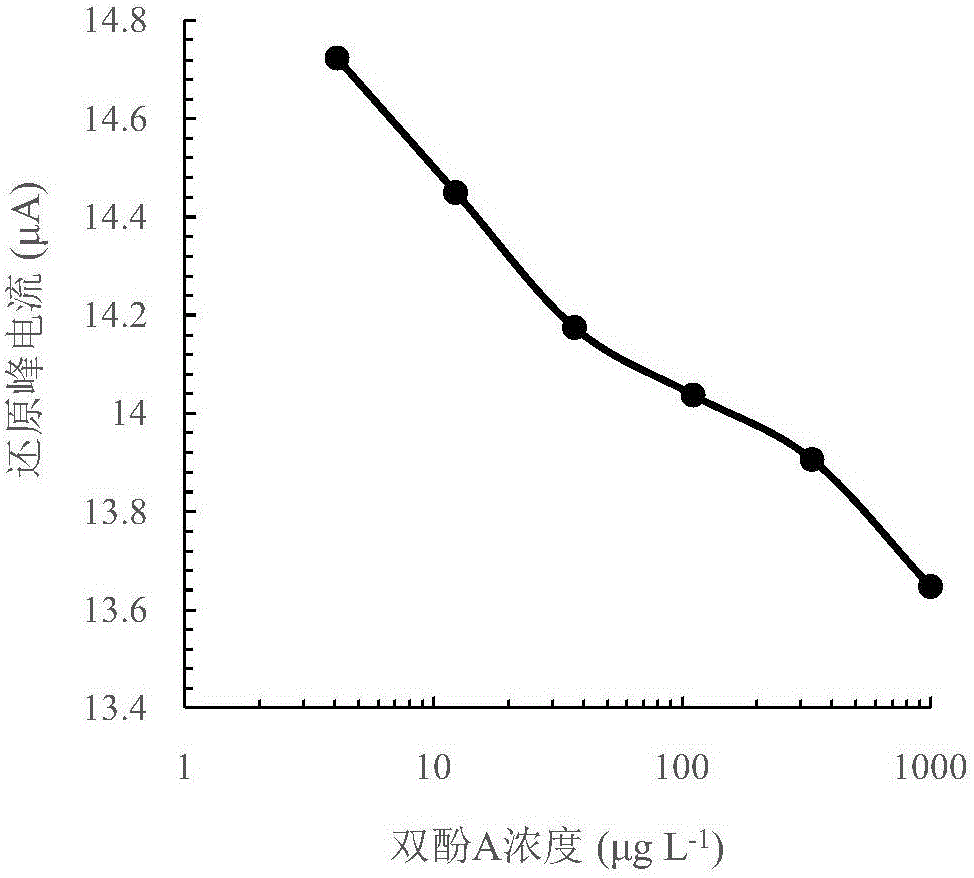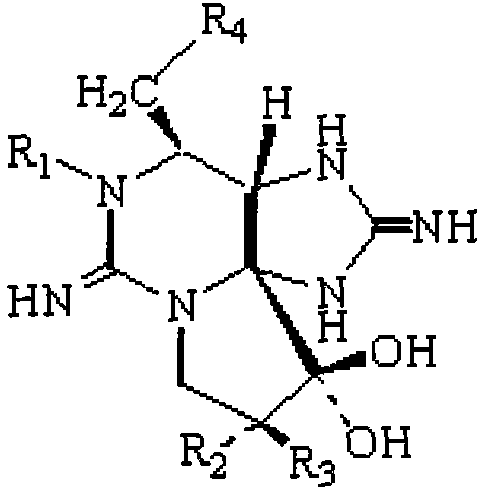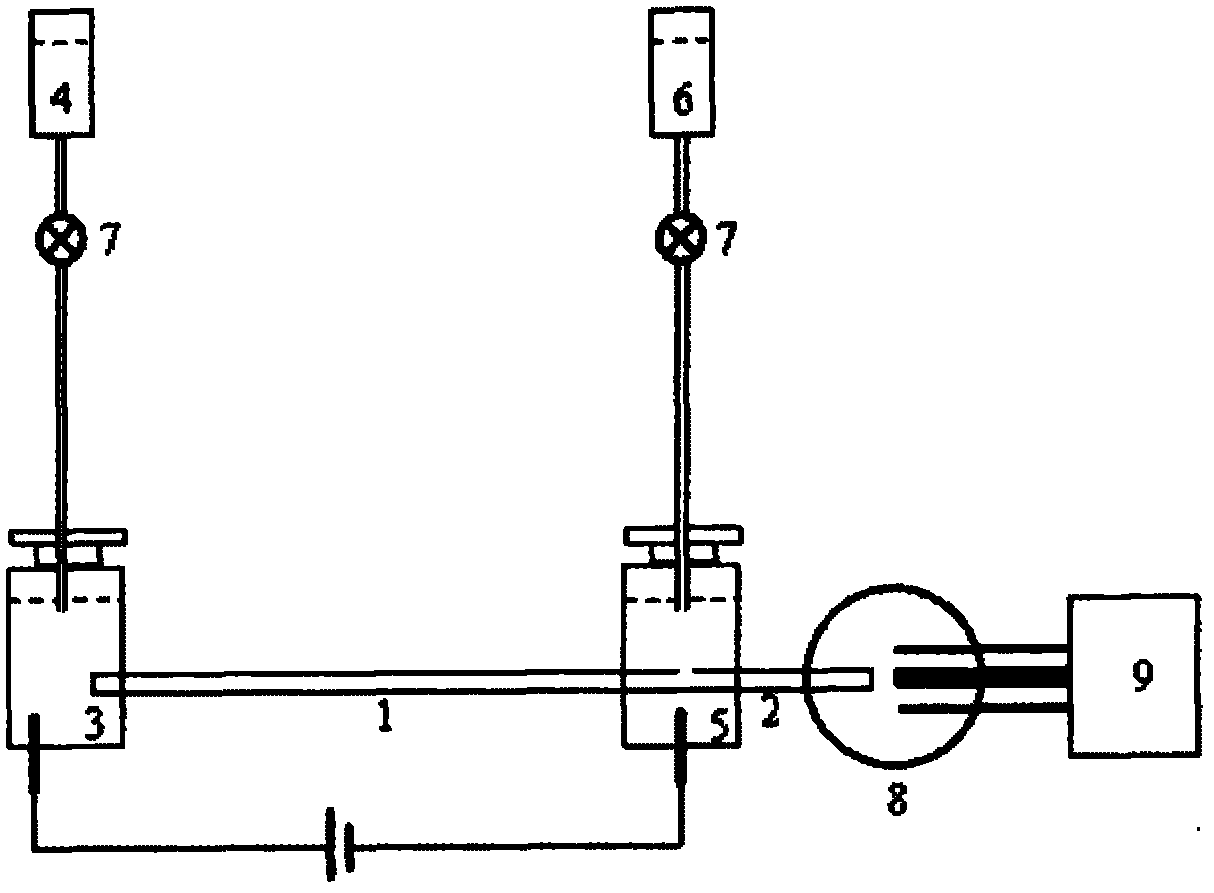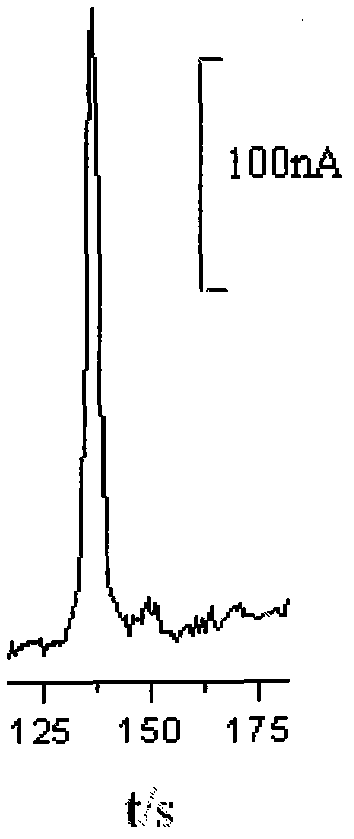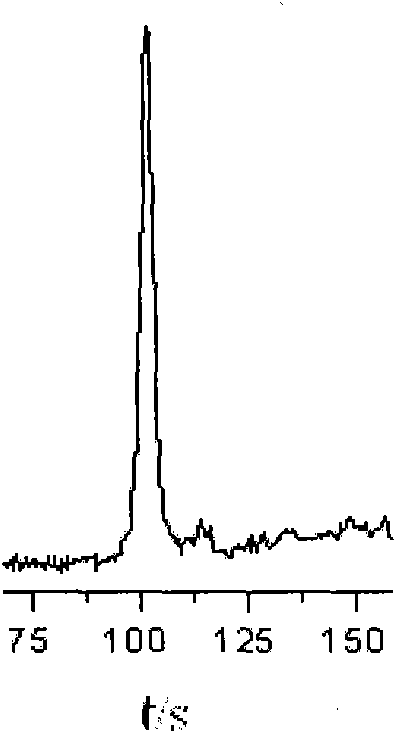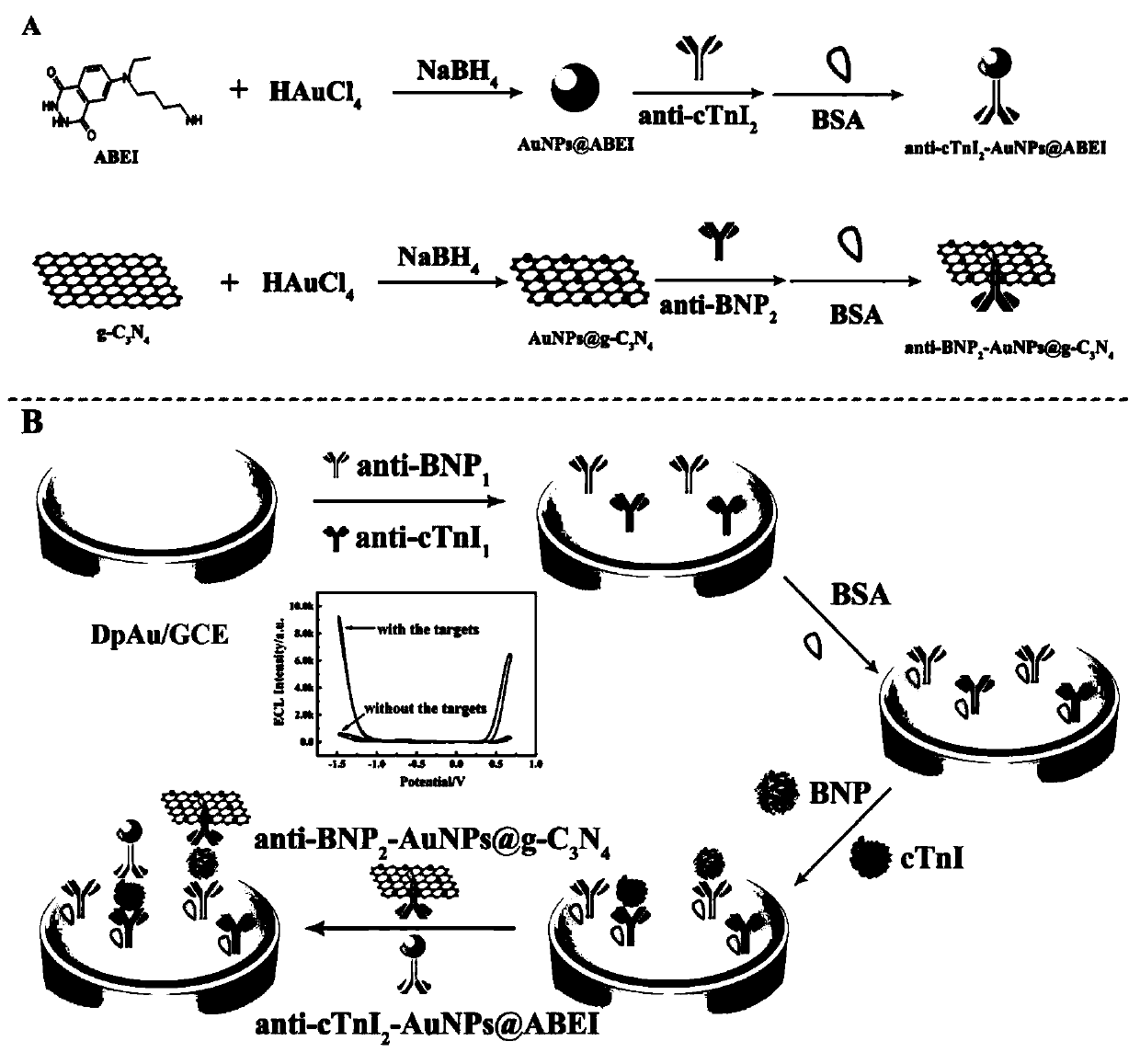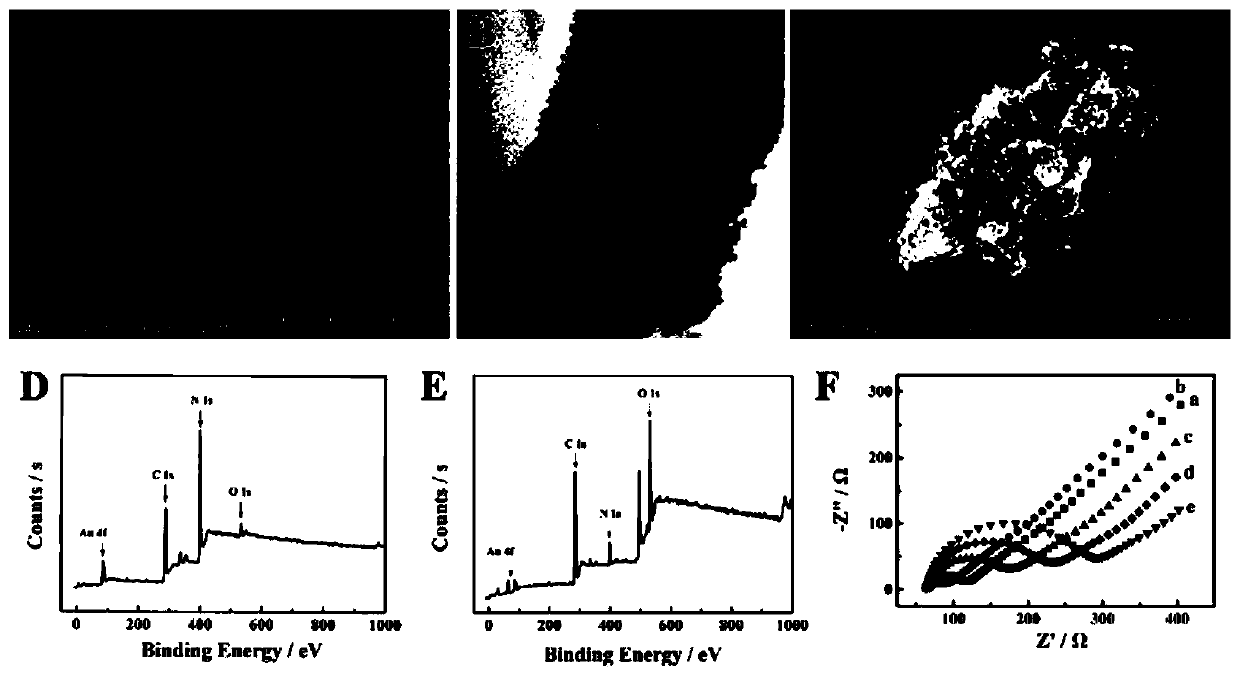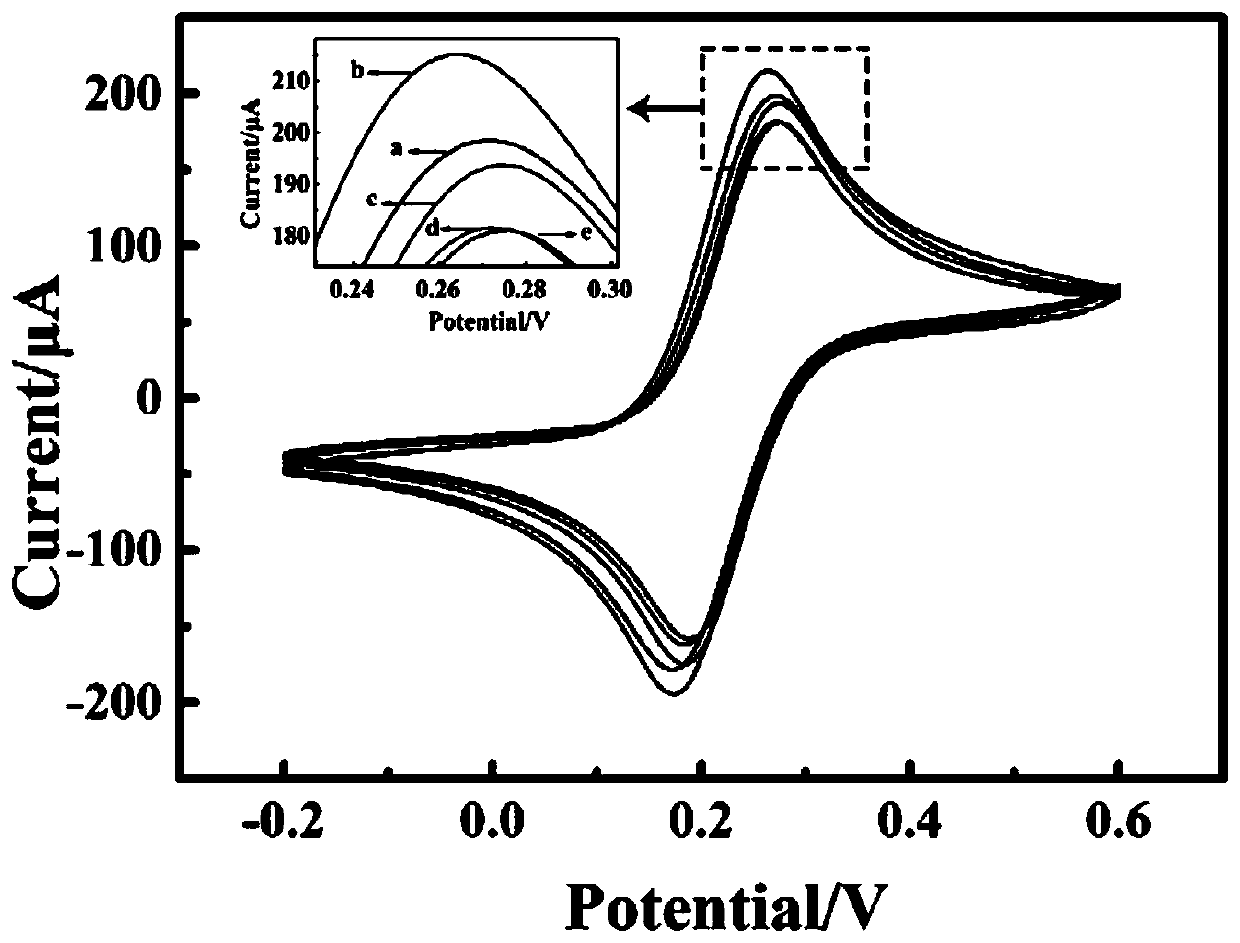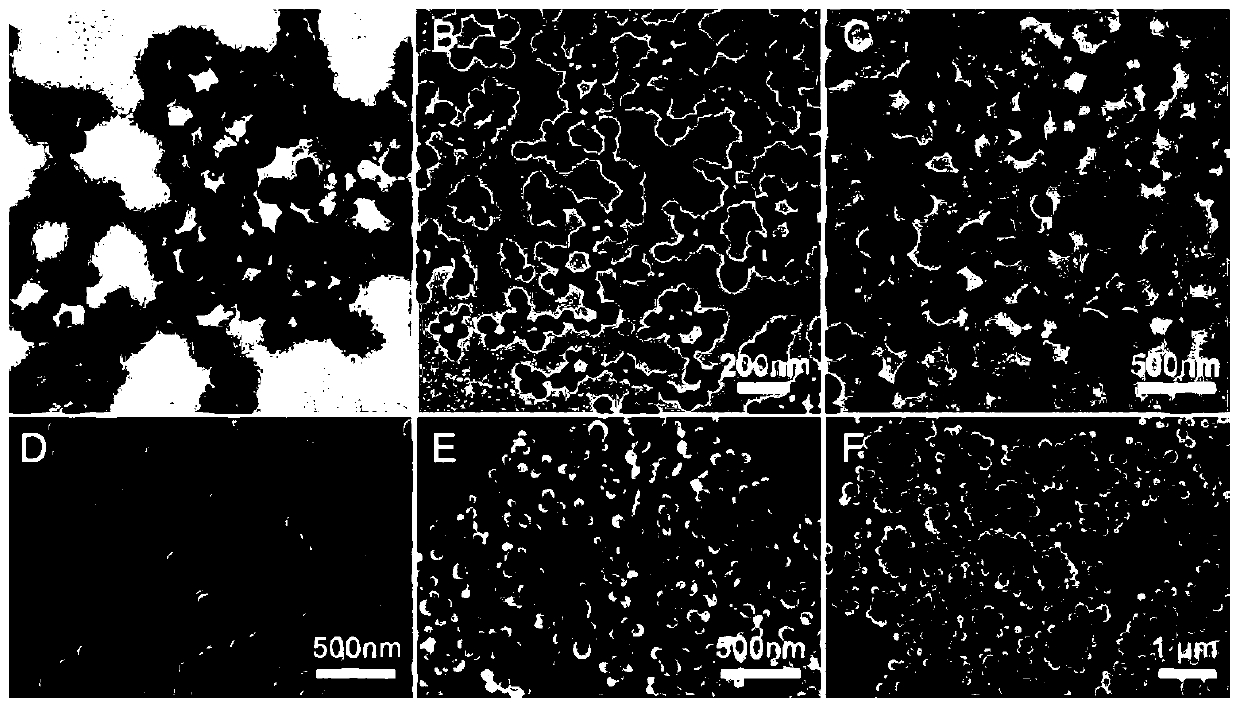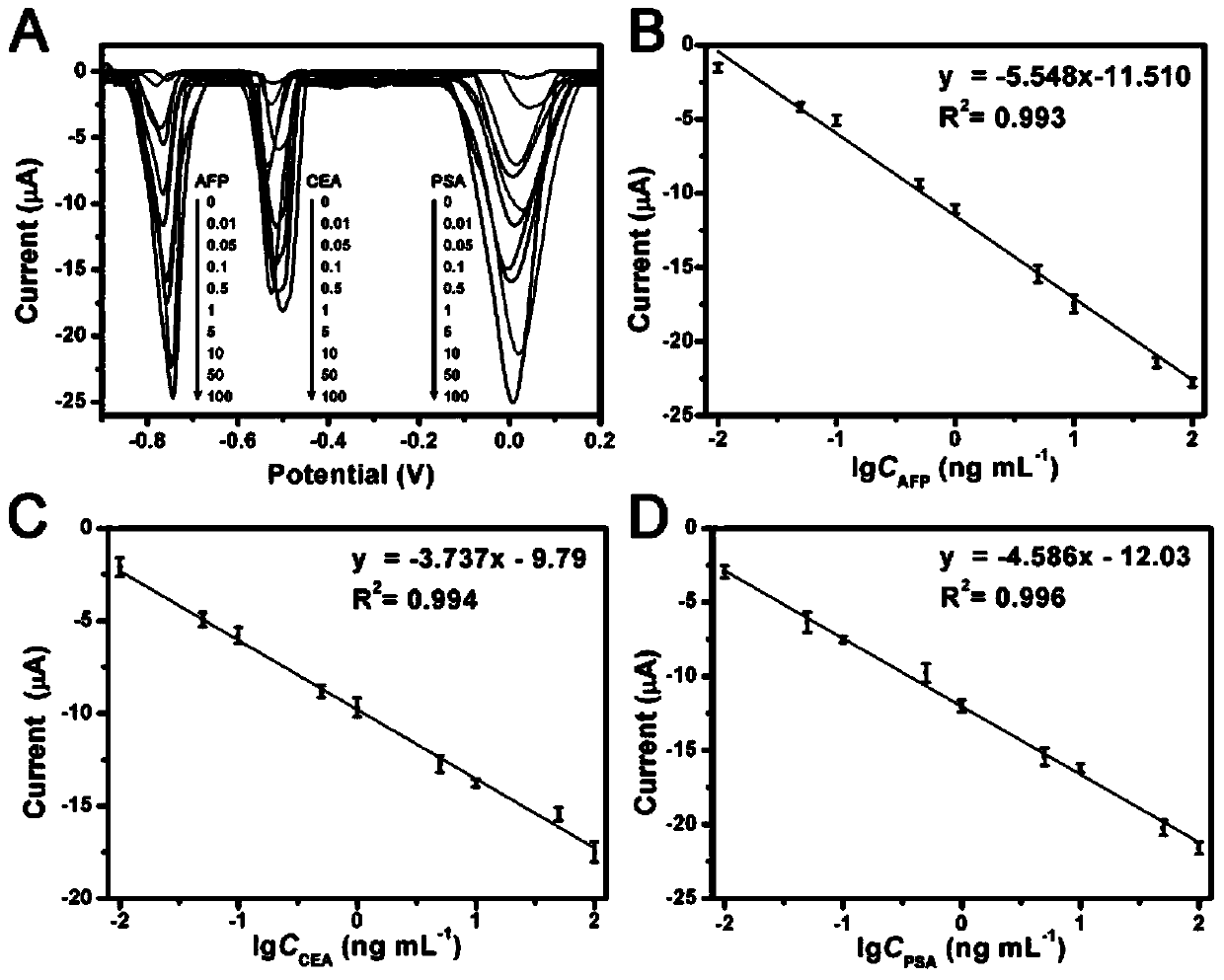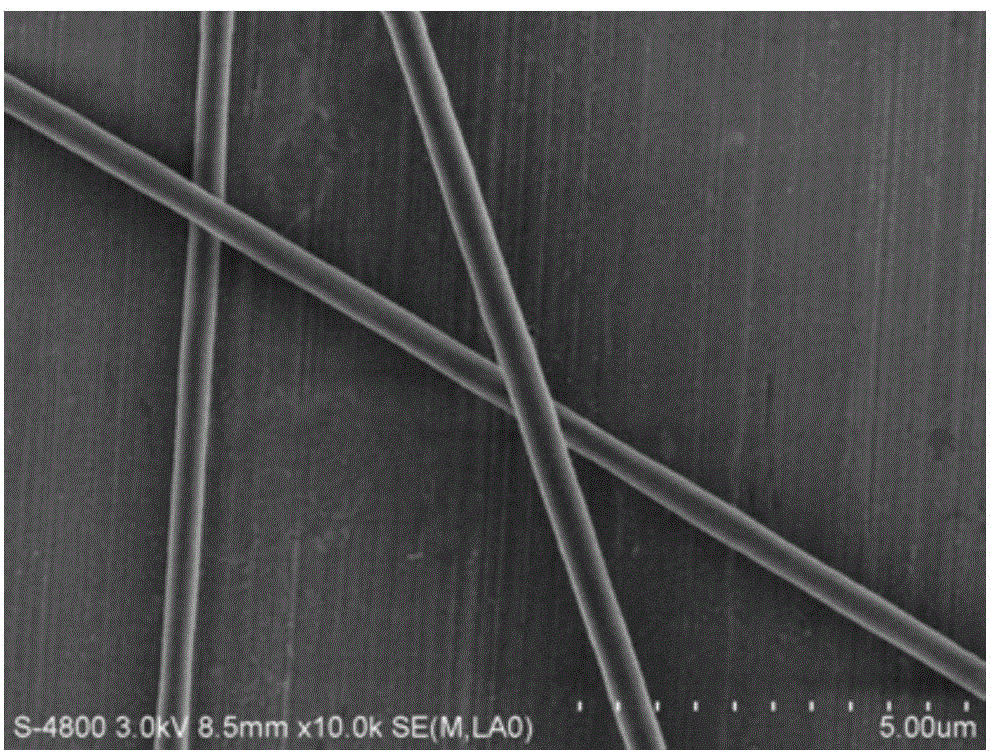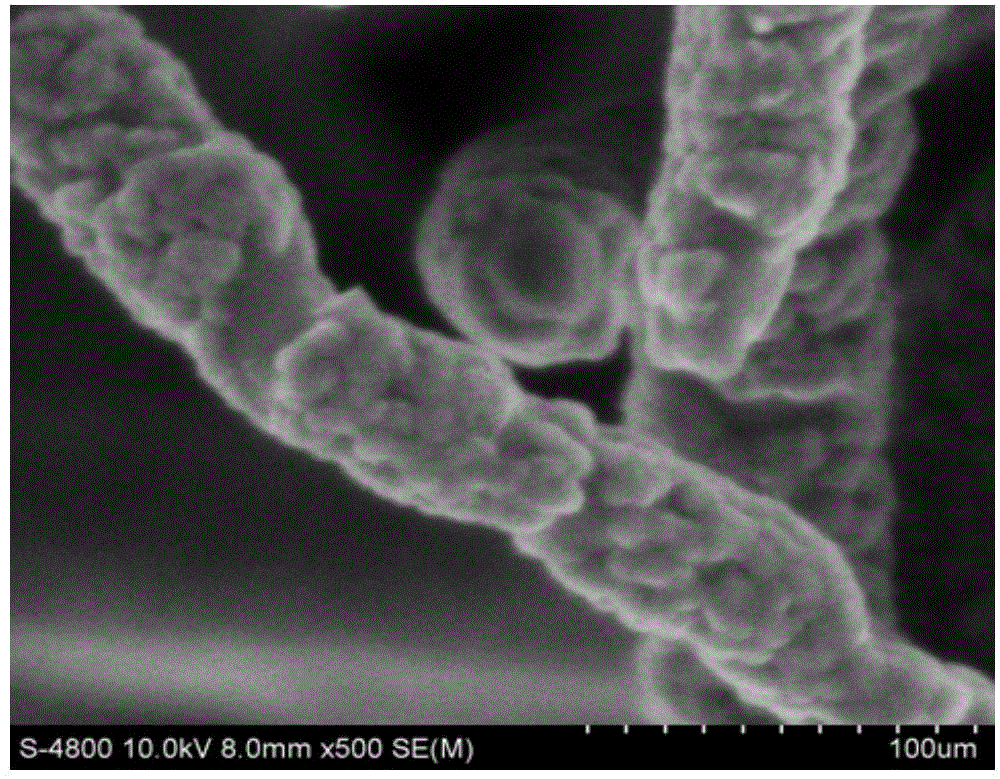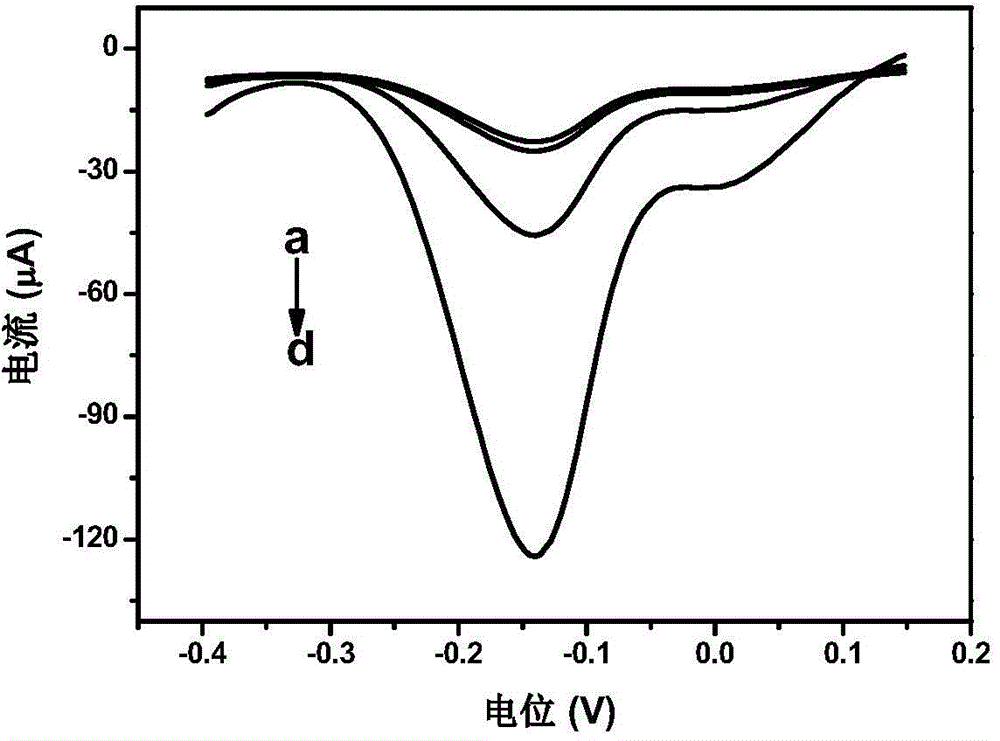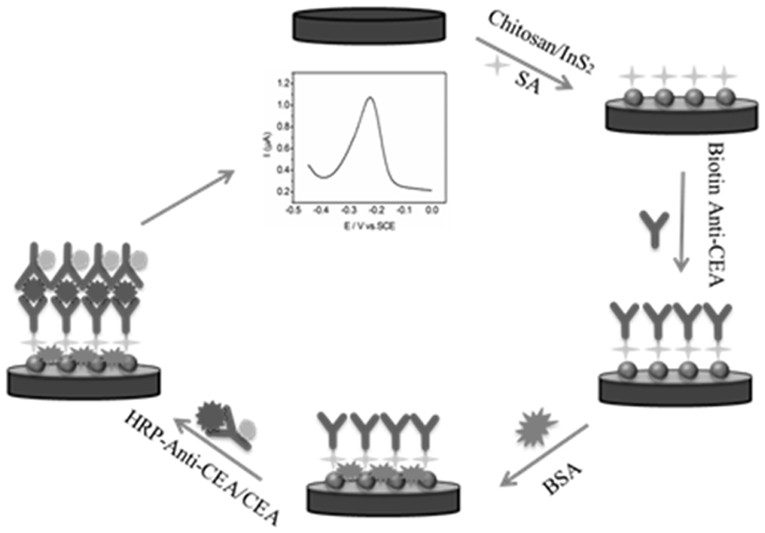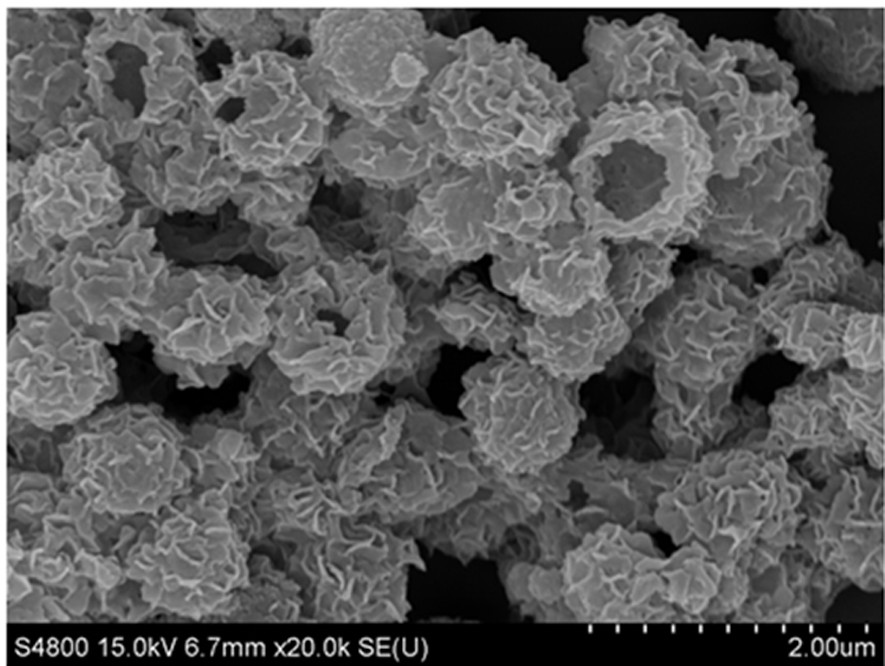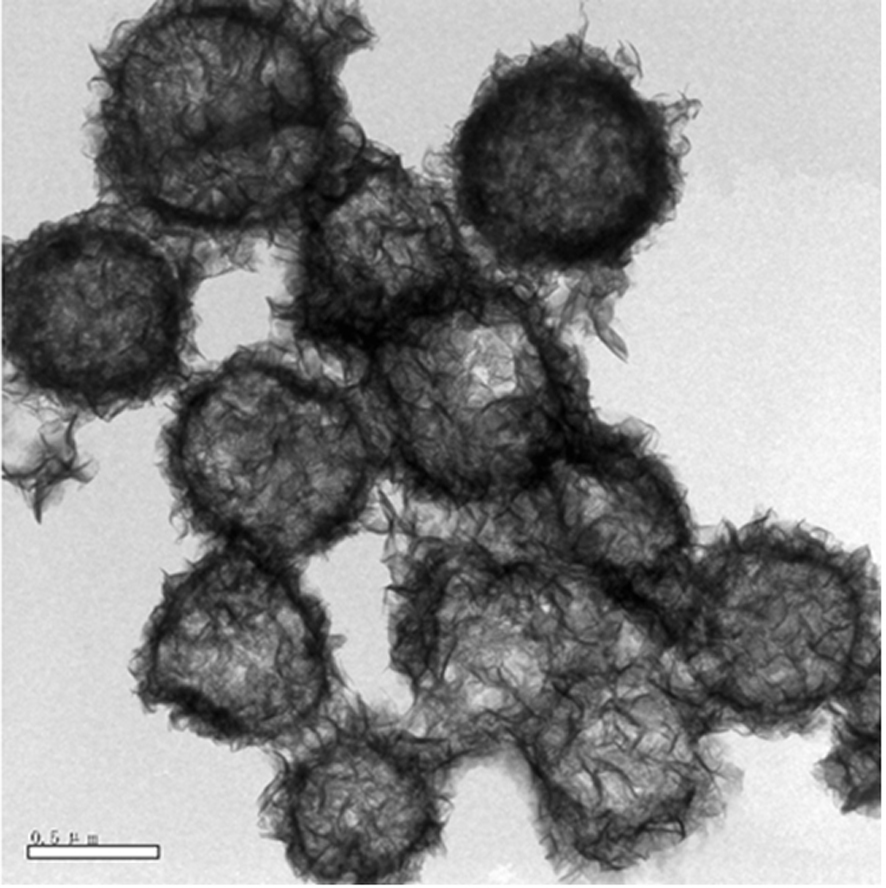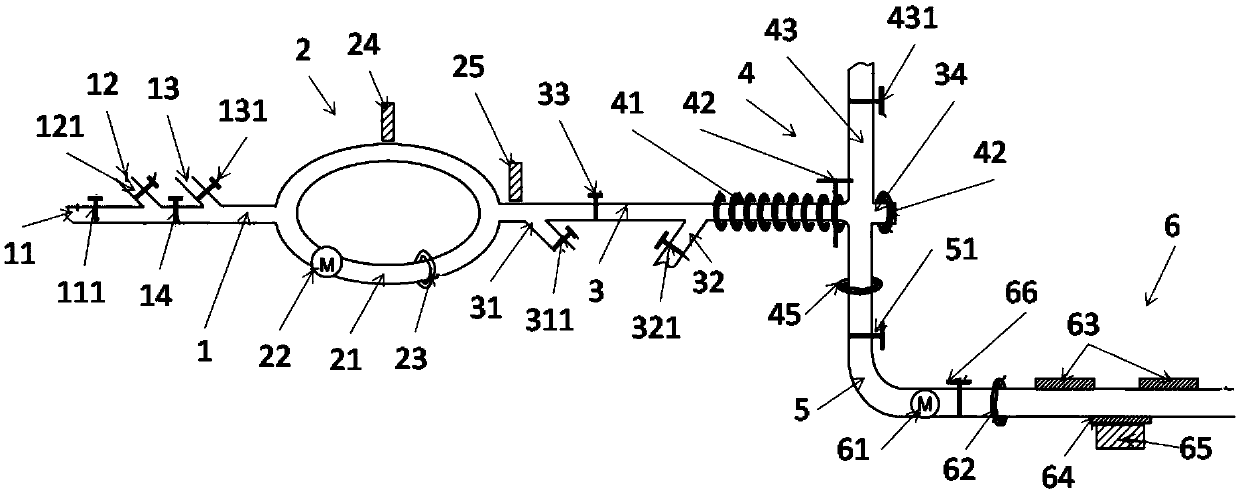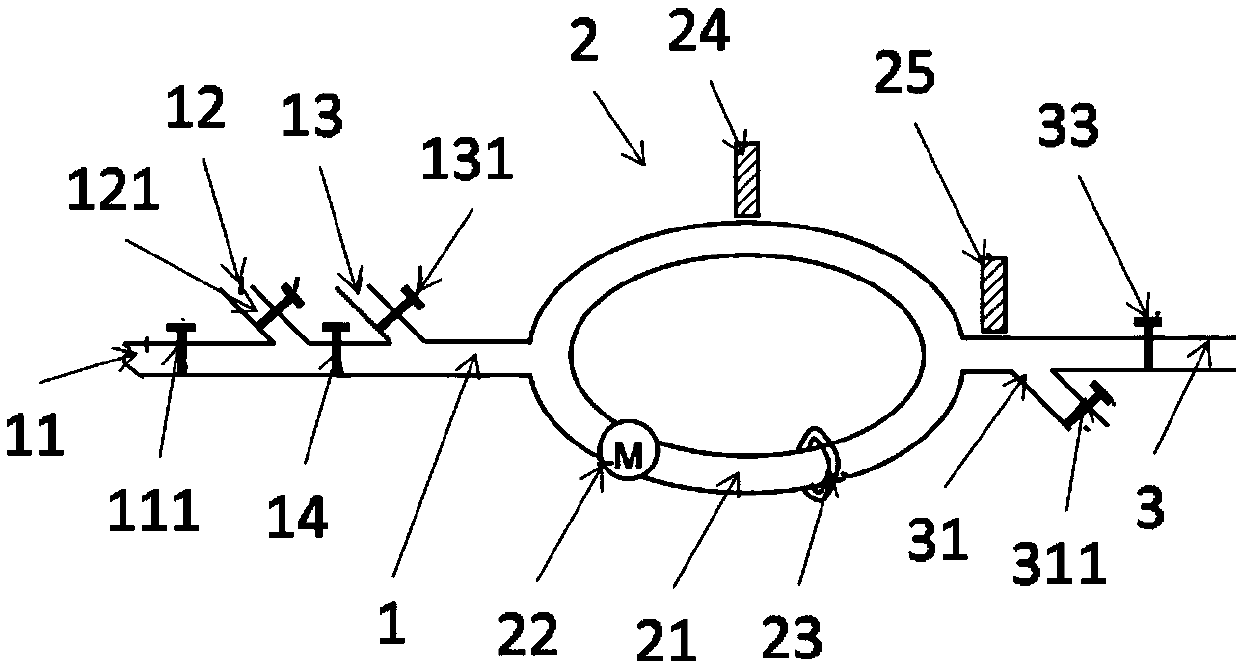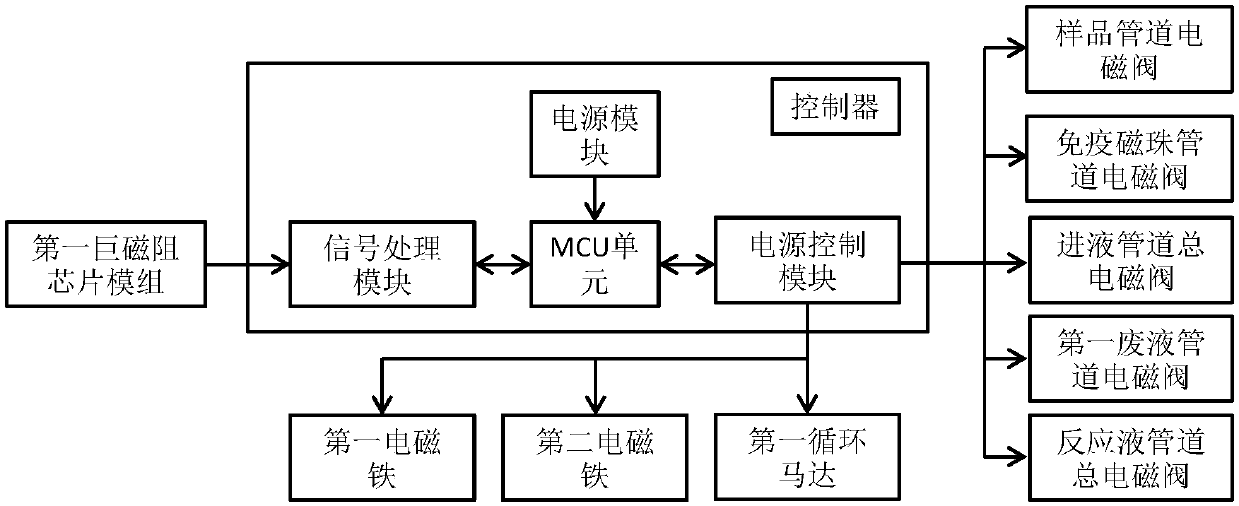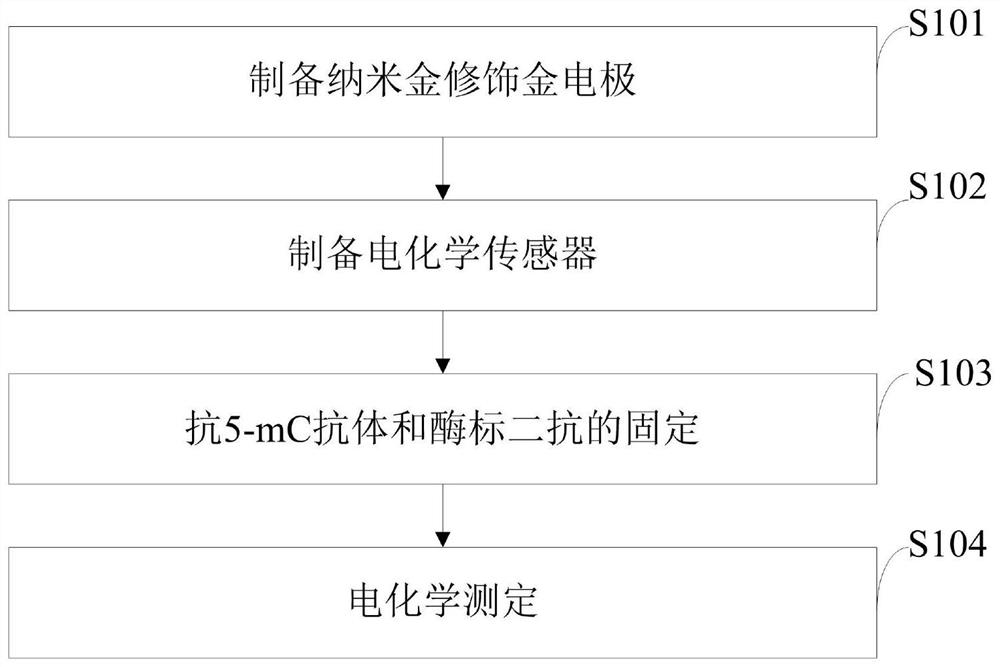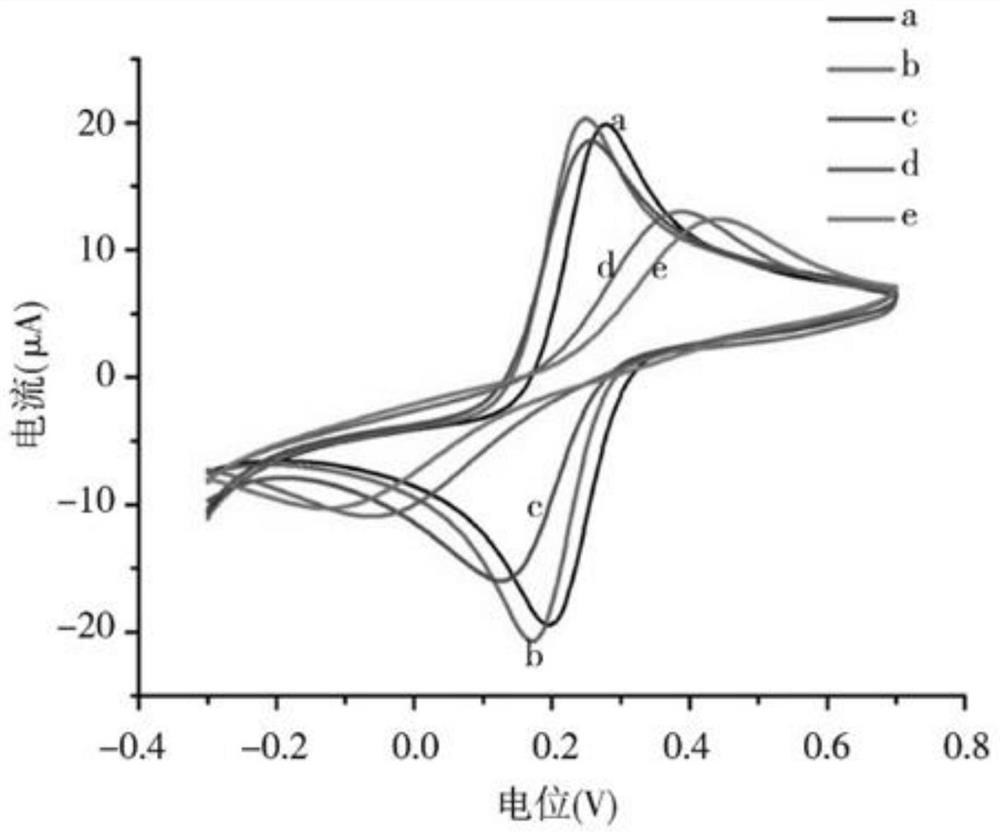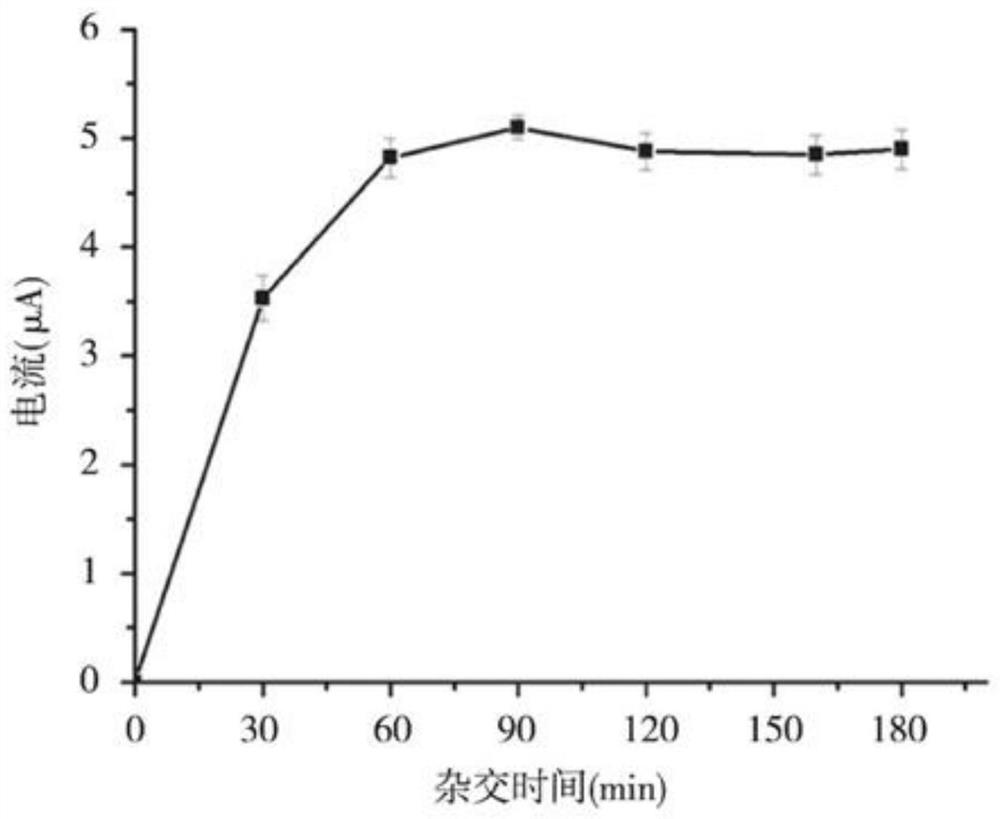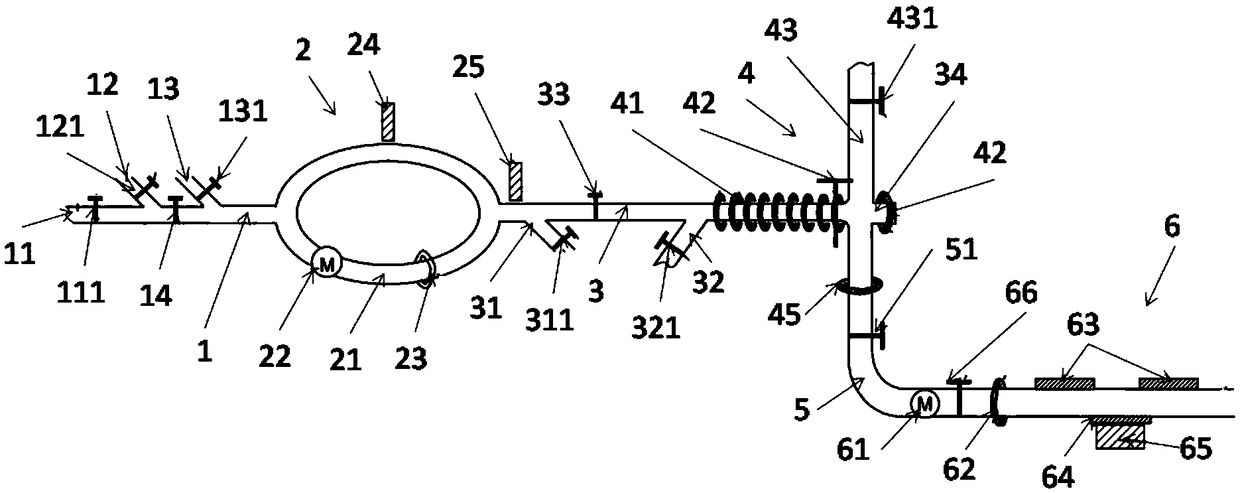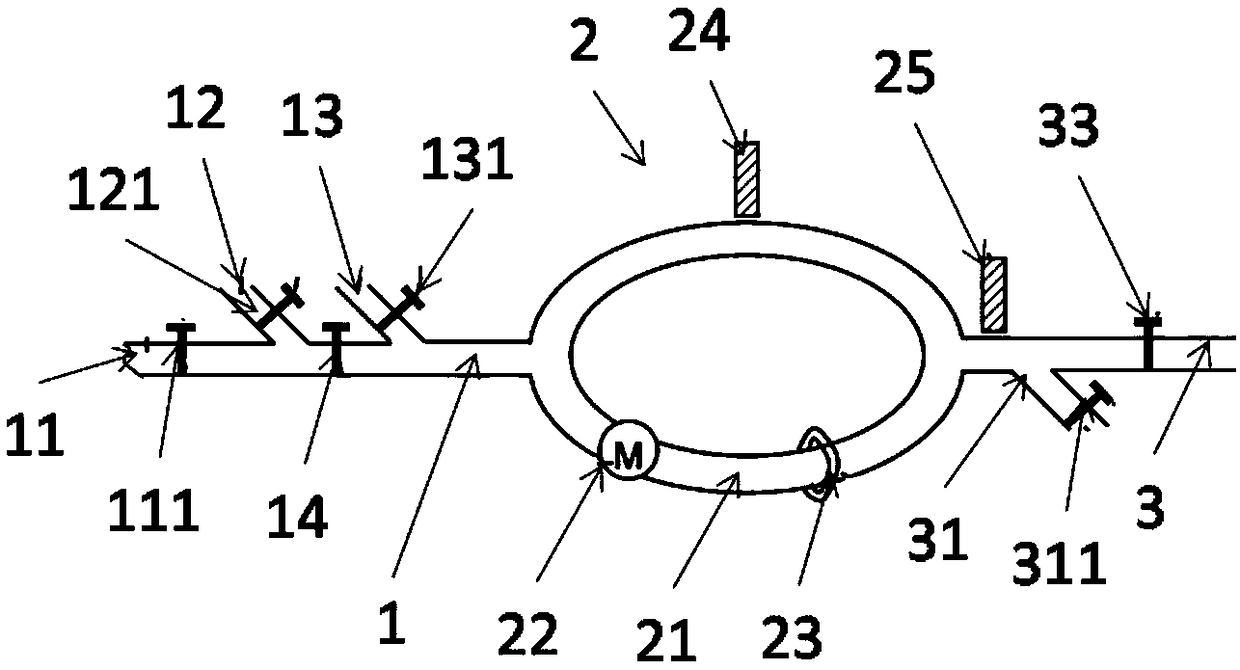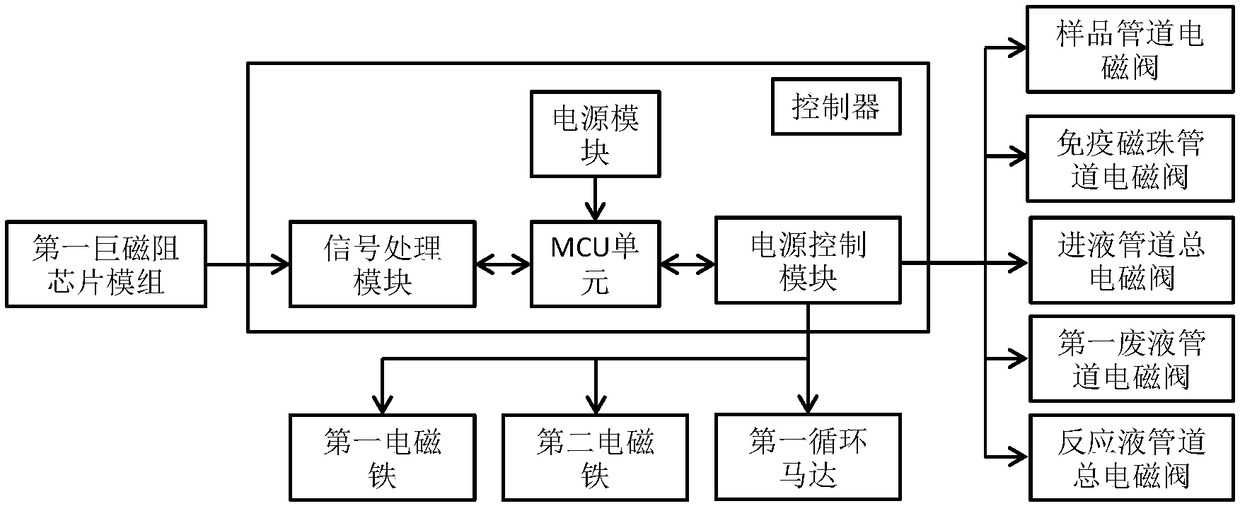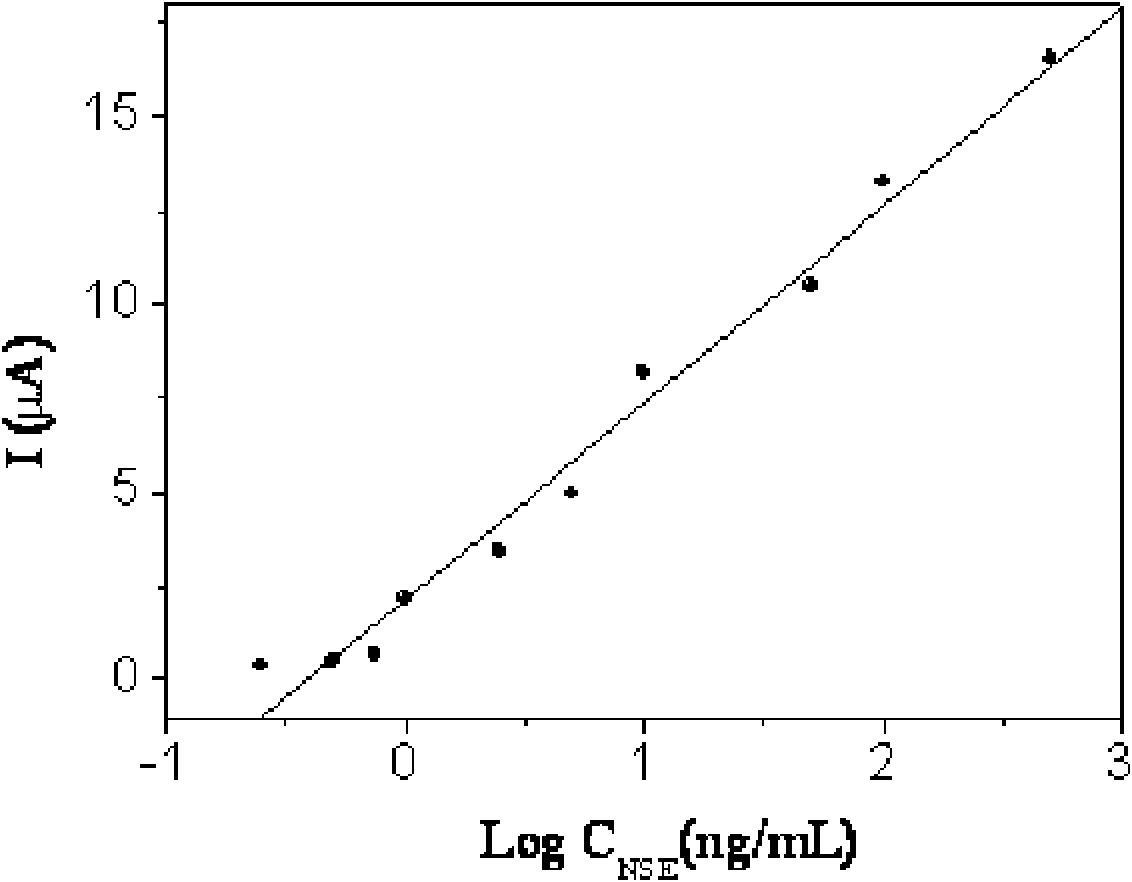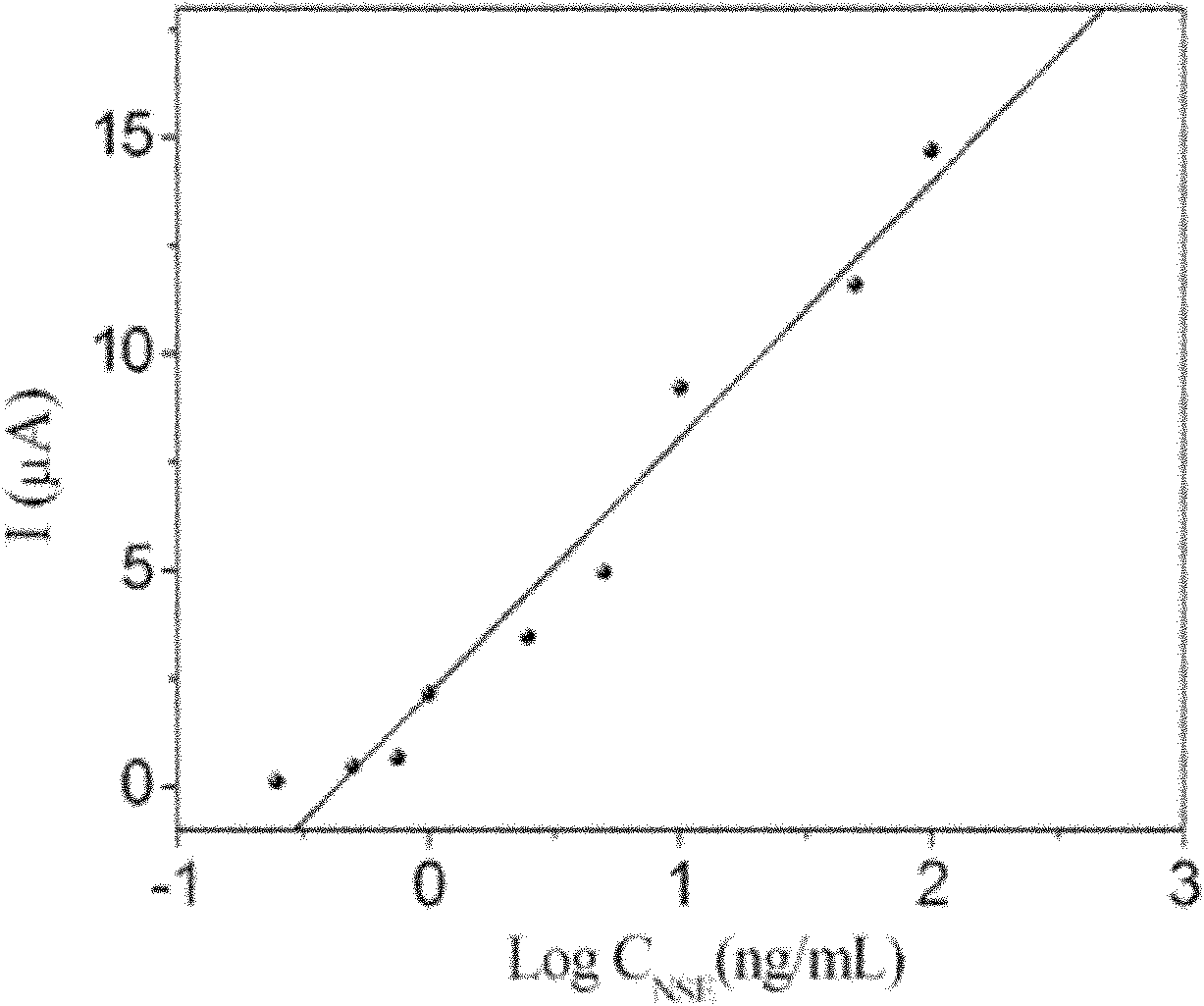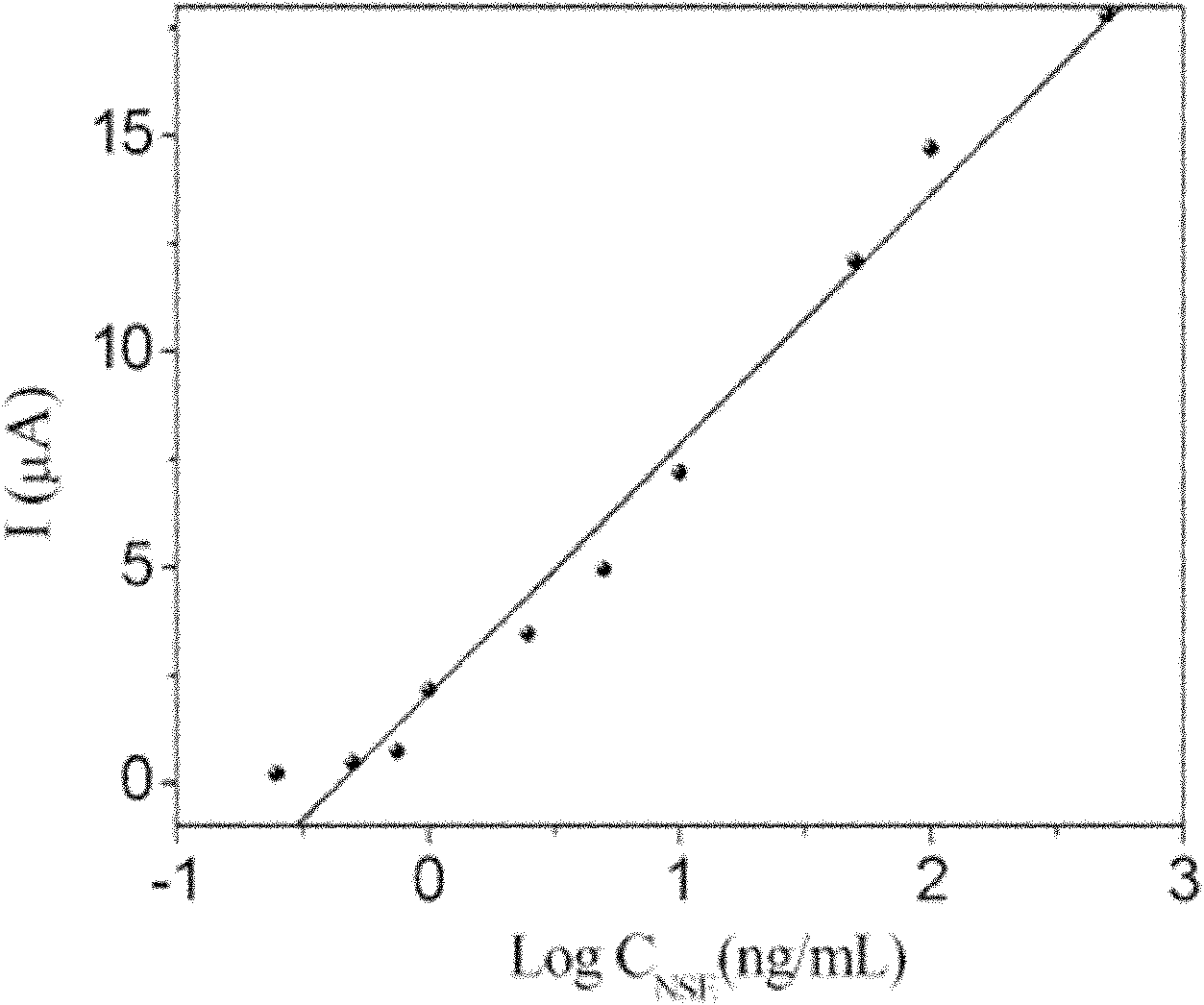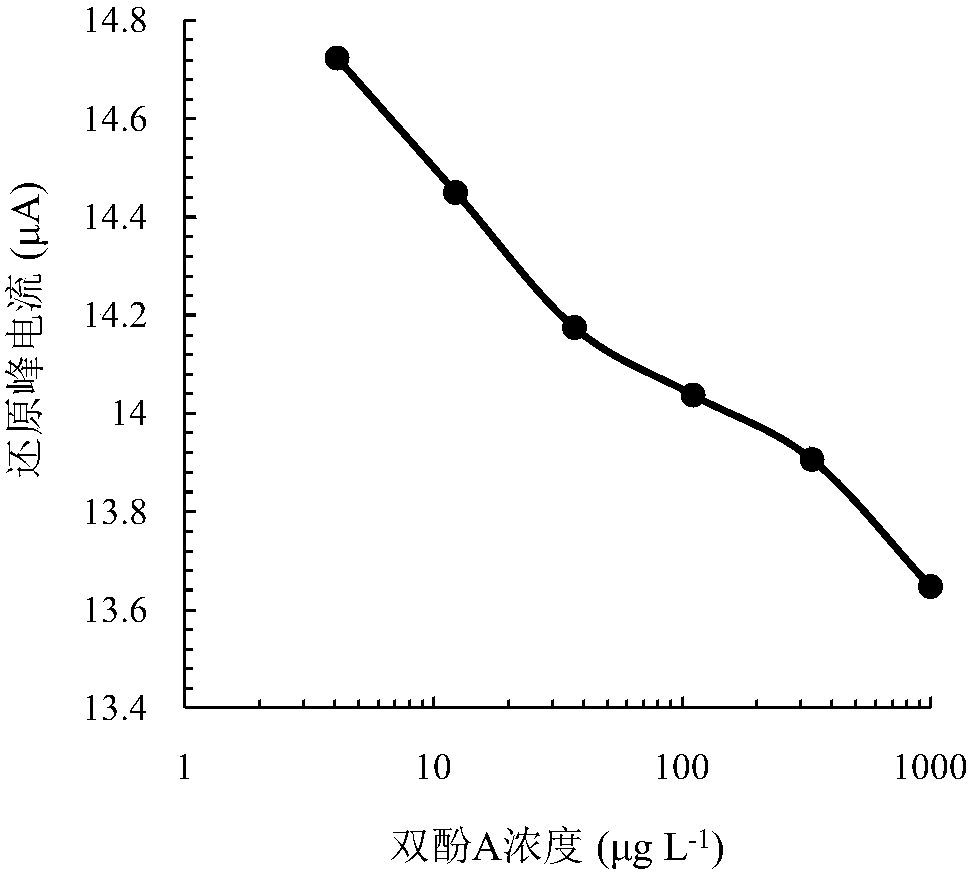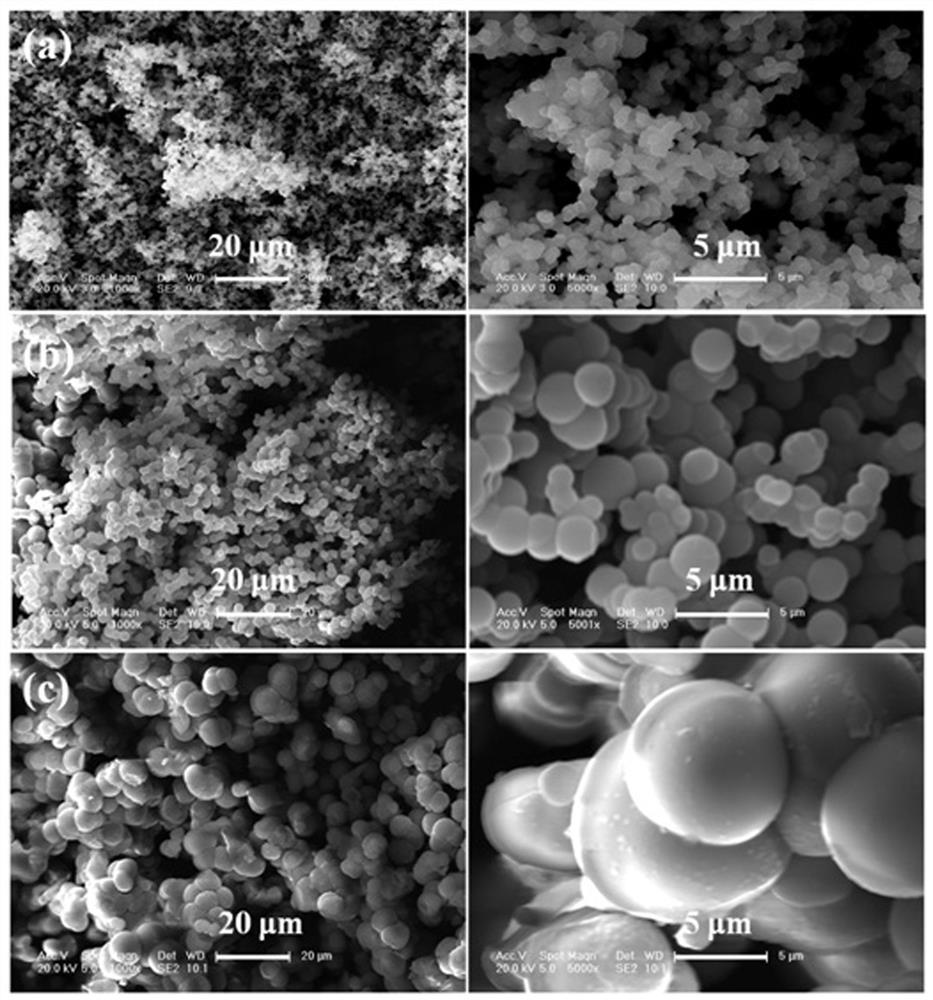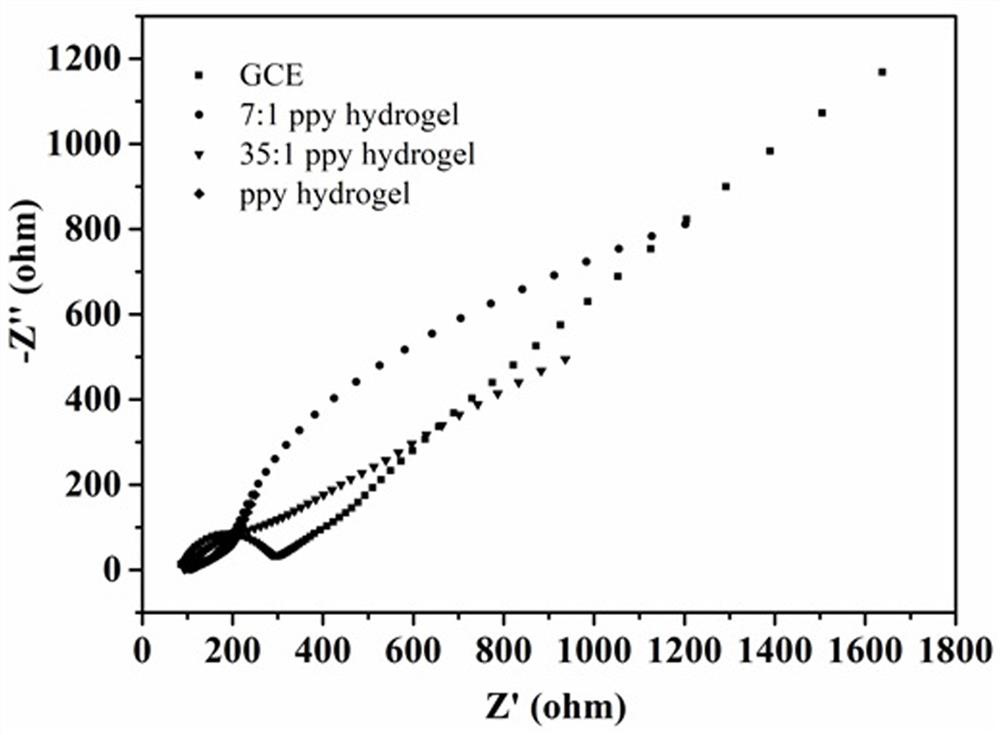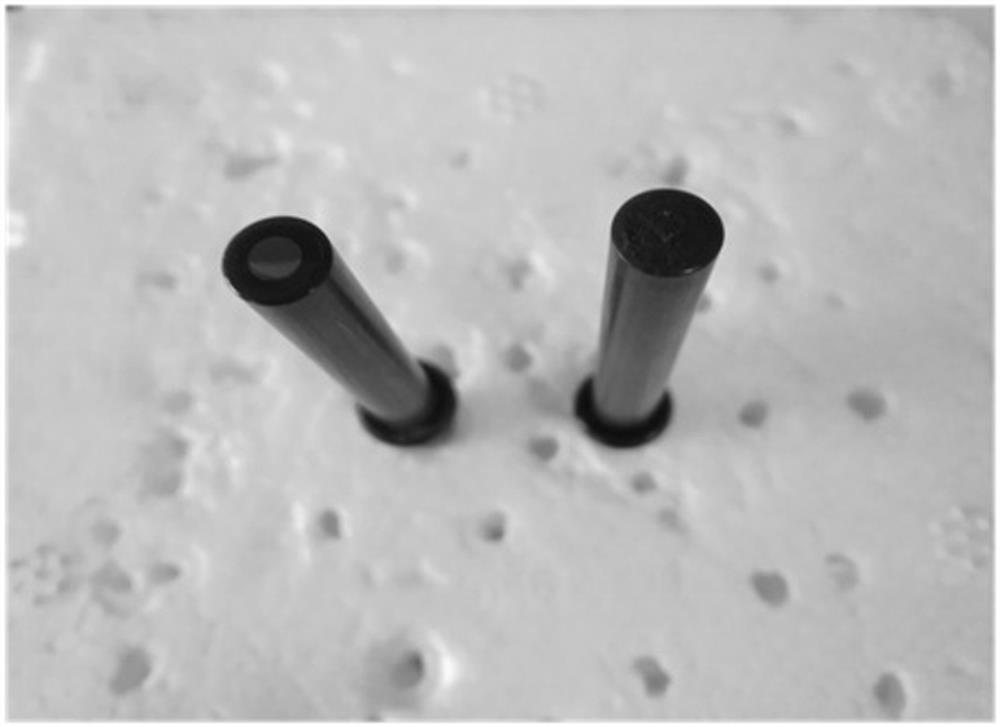Patents
Literature
46 results about "Electrochemical immunoassay" patented technology
Efficacy Topic
Property
Owner
Technical Advancement
Application Domain
Technology Topic
Technology Field Word
Patent Country/Region
Patent Type
Patent Status
Application Year
Inventor
Method and device for electrochemical immunoassay of multiple analytes
InactiveUSRE40198E1High measurement accuracyImprove accuracyImmobilised enzymesBioreactor/fermenter combinationsAnalyteRedox
Owner:ROCHE DIABETES CARE INC
Amelioration of heterophile antibody immunosensor interference
ActiveUS20100248273A1Reduce distractionsBioreactor/fermenter combinationsBiological substance pretreatmentsAnalyteWhole blood sample
The invention is directed to methods and devices for reducing interference from heterophile antibodies in an analyte immunoassay. In one embodiment, the invention is to a method comprising the steps of (a) amending a biological sample such as a whole blood sample with non-human IgM or fragments thereof by dissolving into said sample a dry reagent to yield a non-human IgM concentration of at least about 20 μg / mL or equivalent fragment concentration; and (b) performing an electrochemical immunoassay on the amended sample to determine the concentration of said analyte in said sample. Preferably, the sample is amended with IgG or fragments thereof in addition to the IgM of fragments thereof.
Owner:ABBOTT POINT CARE
Amelioration of heterophile antibody immunosensor interference
ActiveUS8084272B2Reduce distractionsBioreactor/fermenter combinationsBiological substance pretreatmentsAnalyteBiochemistry
The invention is directed to methods and devices for reducing interference from heterophile antibodies in an analyte immunoassay. In one embodiment, the invention is to a method comprising the steps of (a) amending a biological sample such as a whole blood sample with non-human IgM or fragments thereof by dissolving into said sample a dry reagent to yield a non-human IgM concentration of at least about 20 μg / mL or equivalent fragment concentration; and (b) performing an electrochemical immunoassay on the amended sample to determine the concentration of said analyte in said sample. Preferably, the sample is amended with IgG or fragments thereof in addition to the IgM of fragments thereof.
Owner:ABBOTT POINT CARE
Preparation method and application of immunosensor based on dopamine biomemetic modification
ActiveCN103575874ASolving Synthetic DifficultiesSolving the lack of simplicityMaterial analysis by electric/magnetic meansDisease diagnosisNanomaterialsMultiple tumors
The invention discloses a preparation method and application of a non-enzymatic electrochemical immunosensor based on dopamine biomemetic modification and relates to the fields of nano-science, biological immune technology, electrochemical sensing and the like. An electrode is functionalized by utilizing dopamine biomemetic modification, and platinum, silver, palladium and other metal nanoparticles with enzymatic activity are synthesized in situ by utilizing the reduction characteristic of a poly-dopamine modification layer; an antibody is immobilized on the surface of the electrode by means of the interaction of the metal nanoparticles and poly-dopamine modification layer; electrochemical immunoassay on a tumor marker can be realized based on the electrocatalytic effect of the metal nanoparticles to an H2O2 reduction reaction and the identification effect of the antibody molecule to an antigen. The method is simple in steps, easy to operate and low in cost, has a high electrochemical activity and excellent response performance, can solve the problem of difficult nano-material synthesis in a conventional method and lack of simple and effective method, is applicable to preparation of multiple tumor marker immunosensor electrodes, and has a wide application prospect in scientific research and clinical application.
Owner:UNIV OF JINAN
High-flux detection system of multianalyte simultaneous detection and electrochemical immunoanalytical method
InactiveCN101021529ALow costMiniaturizationBiological testingMaterial electrochemical variablesAntigenSensor array
A high-flux detection system and the electrochemistry immune analytical method to detect many analytes at the same time has provided in the invention. It uses the functional chitosan membrane modified by the medium to fix the antigen molecule combining with the competitive immune analytical method, so the antigen in electrode surface competes with the antigen in sample to combine with the enzyme labeled antibody in warm cultivating solution to link the part antibody into the electrode surface, which catalyses the reaction between the H2O2 and the Toluidine Blue fixed in the electrode surface to get the detected antigen content in solution indirectly by the current catalyzed by the H2O2 oxidation. So the electrical medium is fixed in the electrode surface to avoid the signal cross generated by the diffusion which is the immune sensor array without disturbance. Combining with the flowing injection technology, it reaches the high-flux detection output. The sensor array is simple and cost little, also it has the short analyzing time and high sensitivity, so it is important to the life analytical chemistry, the immune science and the clinical medicine.
Owner:NANJING UNIV
Rapid and automated electrochemical method for detection of viable microbial pathogens
InactiveUS20040175780A1Quick checkImprove automationMicrobiological testing/measurementVolume/mass flow measurementBiotechnologyMicrobial disease
A method for in situ detection of viable pathogenic bacteria in a selective medium by measuring cathodic peak current of oxygen on cyclic voltammograms during bacterial proliferation with an electrochemical voltammetric analyzer. The rapid oxygen consumption at a time during the growth of bacteria resulted in a sharp decline of the cathodic peak current curves. The detection times (threshold values) obtained from the cathodic peak current curve were inversely related to the concentrations of the pathogenic bacteria in the medium. This method for detection of pathogenic bacteria is more sensitive than nucleic acid-based polymerase chain reaction (PCR) methods and any of antibody-based methods such as enzyme-linked immunosorbent assay (ELISA) technology, electrochemical immunoassays, immunosensors, and it has a sensitivity similar to conventional culture methods and impedimetric methods but is more rapid than both of them. A calibration curve was obtained by plotting initial cell concentrations (CFU / ml) determined by conventional plate counting, as a function of the detection time.
Owner:THE BOARD OF TRUSTEES OF THE UNIV OF ARKANSAS
ZnTCPP@MOF-based electrochemical immunoassay method for microcystic toxins
ActiveCN107290412AGood ECL signalHigh detection sensitivityChemiluminescene/bioluminescenceMaterial electrochemical variablesAntigenLower limit
The invention discloses a ZnTCPP@MOF-based electrochemical immunoassay method for microcystic toxins. The method comprises the following steps: modifying an electrode by a porphyrin-functionalized metal-organic framework ZnTCPP@MOF; increasing the stability of the ZnTCPP@MOF on the electrode by utilizing tetra-n-octylammonium bromide; and dripping microcystic toxin MC-LR antigen and monoclonal antibody, and assembling to form an electrochemical immunosensor. The electrochemical immunosensor prepared by the method disclosed by the invention is capable of realizing high-sensitivity and high-specificity detection of the microcystic toxin MC-LR, the generated electrochemical luminescence signal is stable, the lower limit of detection on the microcystic toxin MC-LR is low, and the method has excellent application prospects in the field of detection of biological and environmental microcystic toxins.
Owner:迈科若(苏州)医疗科技有限公司
Nuclease amplified high-sensitivity electrochemical immunoassay method
ActiveCN104328192ARealize detectionEasy to makeMicrobiological testing/measurementProtein targetImmune complex deposition
The invention relates to a nuclease amplified high-sensitivity electrochemical immunoassay method. The method comprises the steps of carrying out self-assembly to methylene blue (MB) marked hairpin DNA on the surface of a gold electrode to construct an electrochemical immunosensing interface under the Au-S bonding effect; enabling antibody 1, antibody 2 and antibody 3 to recognize target proteins simultaneously to form immune complex under the existence of the target proteins by taking the mixed solution of Mg<2+>, DNA1-antibody1, DNA2-antibody2 and DNA3-antibody3 as detection liquid, and enabling DNA1, DNA2 and DNA3 to be close with one another to perform ortho-position hybridization to form Mg<2+>-dependent nuclease, so as to perform catalytic cracking to the hairpin DNA on the sensing interface, so that the MB is separated from the surface of the electrode and the oxidized current is reduced; determining the concentration of the target protein by detecting the change of the current of the MB. The immunoassay method utilizes three DNA-antibody conjugates to form a nuclease amplified detection signal in an ortho-position manner, can improve the detection sensitivity and the selectivity, can detect the target proteins rapidly in a one-step manner, and has good clinical application value.
Owner:NANJING UNIV +1
Dual-mode separation type immunosensor based on enzyme-induced biological etching and preparation method thereof
ActiveCN110006972AAccurate and reliable readout resultsIntuitive test resultsMaterial analysis by observing effect on chemical indicatorMaterial electrochemical variablesEtchingDual mode
The invention discloses a dual-mode separation type immunosensor based on enzyme-induced biological etching. A cadmium sulfide / zinc oxide nanorod array CdS / ZnO NRs covers / is prepared at the surface ofa three-dimensional reduced graphene oxide r-GO as a photoelectrode; gold nanoparticle dual-cone Au NBPs are adopted as a multicolor chromogenic substrate; horse radish peroxidase (HRP) is used to connect with photo-electrochemical immunoassay and colorimetric detection, wherein Cd / ZnO NRs / r-GO generates biological etching through the enzymic catalytic reaction induced by HRP so as to form lightcurrent change, and hydroxyl radical generated by catalytic oxidation of the hydrogen peroxide by the HRP is used for biological etching of Au NBPs to form gold nanoparticles with different sizes andshapes so as to display the color change and the blue shift of an LSPR peak. The method adopts a lipidosome to package a lot of HRPs and load more Ab2 to effectively amplify response signals so as tofurther improve the accuracy of the detection.
Owner:SOUTH CHINA AGRI UNIV
Buffer solution for electrochemiluminescence immunity analyzer and preparation method of buffer solution
ActiveCN104698164AReduce dosageHarm reductionChemiluminescene/bioluminescenceDisease diagnosisPolidocanolPolythylene glycol
The invention belongs to agents for medical diagnostic apparatuses, and in particular relates to a buffer solution for an electrochemiluminescence immunity analyzer and a preparation method of the buffer solution. The buffer solution for the electrochemiluminescence immunity analyzer comprises the following components: potassium dihydrogen phosphate 4, tween-20, dodecyl polyglycol ether, polidocanol, tripropyl amine and citric acid; and the pH value of the buffer solution is 6.5-7.0. The buffer solution for the electrochemiluminescence immunity analyzer is simple to prepare and less in usage amount of tripropyl amine to reduce harms of tripropyl amine to bodies of operators and reduce the burden of the environment; the R value of a correlation coefficient after linear regression reaches more than 0.99 compared with an imported buffer solution for an electrochemical immunity analyzer and expresses relatively good relativity; and moreover, the buffer solution is low in production cost, and the selling price can be reduced by 30% compared with a reagent for an equivalent blood cell analyzer on the market, so that the buffer solution for the electrochemiluminescence immunity analyzer is beneficial for large-scale popularization and application.
Owner:ZHONGSHAN CHUANGYI BIOCHEM ENG
Gold nanorod biotic compound and preparation method and applications thereof
InactiveCN104493160AHigh sensitivityImprove accuracyMaterial nanotechnologyMaterial electrochemical variablesGold nanorodFerrocenecarboxylic acid
The invention discloses a gold nanorod biotic compound and a preparation method and applications thereof and belongs to the technical field of electrochemical analysis. A gold nanorod modified by silicon dioxide (AuNRs@SiO2) is used as a carrier and combined with a detection antibody (dAb) and ferrocenecarboxylic acid (Fc) to prepare dAb-AuNR-Fc which is used for amplifying escherichia coli in an electrochemical immunoassay dairy product. A 'sandwich' immunoassay model is established on basis of specificity interaction between the escherichia coli and escherichia coli antibody, and Fc combined with an electrode surface is measured by a differential pulse voltammetry to obtain a current signal. According to the gold nanorod biotic compound and the preparation method and the applications thereof, the electrochemical immunoassay method based on dAb-AuNR-Fc biotic compound is used for escherichia coli detection, the detection sensitivity, the specificity and the accuracy are high, and a novel method is provided for analysis and research of the escherichia coli in the dairy product.
Owner:JIANGSU UNIV
Rotary type electrochemical immunoassay paper chip analysis device and detection method thereof
ActiveCN107991484AEasy to controlSimplify the immunoassay processMaterial analysisBiomedical engineeringMedical treatment
The invention relates to the technical field of electrochemical analysis, biological immunity and micro-fluidic chips, in particular to a rotary type electrochemical immunoassay paper chip analysis device and a detection method thereof. The device comprises an auxiliary disc, a reagent disc and a washing disc which are rotationally connected, wherein the auxiliary disc, the reagent disc and the washing disc can independently rotate; a respective fluid passage is formed in each of the auxiliary disc, the reagent disc and the washing disc; holes are formed in each fluid passage; the fluid is controlled to flow in each hole when the holes formed in the auxiliary disc, the reagent disc and the washing disc and are rotated to the mutually communicated holes. Each layer of paper chips in the device can independently rotate around the center, so that a rotating valve is ingeniously integrated onto the paper chip device for controlling the flowing of fluid on the paper chip. The preparation ofthe device in the invention is simple and fast; the operation is convenient; a novel device is provided for the fast and convenient medical instant diagnosis.
Owner:YANTAI INST OF COASTAL ZONE RES CHINESE ACAD OF SCI
Rapid and automated electrochemical method for detection of viable microbial pathogens
InactiveUS7238496B2Microbiological testing/measurementVolume/mass flow measurementPeak currentBiology
A method for in situ detection of viable pathogenic bacteria in a selective medium by measuring cathodic peak current of oxygen on cyclic voltammograms during bacterial proliferation with an electrochemical voltammetric analyzer. The rapid oxygen consumption at a time during the growth of bacteria resulted in a sharp decline of the cathodic peak current curves. The detection times (threshold values) obtained from the cathodic peak current curve were inversely related to the concentrations of the pathogenic bacteria in the medium. This method for detection of pathogenic bacteria is more sensitive than nucleic acid-based polymerase chain reaction (PCR) methods and any of antibody-based methods such as enzyme-linked immunosorbent assay (ELISA) technology, electrochemical immunoassays, immunosensors, and it has a sensitivity similar to conventional culture methods and impedimetric methods but is more rapid than both of them. A calibration curve was obtained by plotting initial cell concentrations (CFU / ml) determined by conventional plate counting, as a function of the detection time.
Owner:THE BOARD OF TRUSTEES OF THE UNIV OF ARKANSAS
Bovine cell factor electrochemical label-free impedimetric immunodetection method
InactiveCN103472238AAnalysis method is simpleAnalytical method is fastBiological testingMaterial electrochemical variablesAntibodyAnalytical chemistry
The invention relates to a bovine cell factor electrochemical label-free impedimetric immunodetection method belonging to the technical field of electrochemical immunoassay. The method comprises the following steps: ultrasonically dispersing a nano material in a chitosan solution, thus preparing a nano material / chitosan compound; modifying a bovine cell factor antibody fixed on a glassy carbon electrode with the nano compound, thus obtaining a novel bovine cell factor immunosensor; and then, using the immunosensor for bovine cell factor electrochemical label-free impedimetric immunodetection. The detection method does not need labels, is simple, quick, low in cost, high in sensitivity and favorable in reproducibility and stability, and can be used for early diagnosis of bovine tuberculosis and research on bovine cell immune mechanism.
Owner:YANGZHOU UNIV
Preparation method for bovine gamma interferon impedance type immunosensor based on zinc oxide nano-materials
ActiveCN104090116ALarge specific surface areaGood biocompatibilityBiological testingMaterial electrochemical variablesGamma interferonInterferon antibodies
The invention discloses a preparation method for a bovine gamma interferon impedance type immunosensor based on zinc oxide nano-materials, and belongs to the technical field of electrochemical immunoassay. A glassy carbon electrode is modified by the zinc oxide nano-materials with different morphologies and excellent performances, and a bovine gamma interferon antibody is fixed on the electrode, so that a novel electrochemical impedance type immunosensor is prepared. The novel electrochemical impedance type immunosensor can be applied to unmarked electrochemical immunoassay of bovine gamma interferon. The immunosensor does not need to be marked, is simple, quick, low in cost, high in sensitivity, good in reproducibility and good in stability, and can be used for early diagnosing of bovine tuberculosis and research of a bovine cellular immunity mechanism.
Owner:YANGZHOU UNIV
Electrochemical immunoassay method based on Dopamine embedded liposome
InactiveCN102226810ABiological testingMaterial electrochemical variablesSpecific immunityCarbon nanotube
The invention discloses an electrochemical immunoassay method based on Dopamine embedded small single-layer liposome. The method comprises the following steps: ProGRP antibodies are subjected to a specific immunization reaction with ProGRPs in a sample to be detected; a conjugate of the dopamine embedded small single-layer liposome and the ProGRP antibodies, which is added and is demulsified by a surfactant, releases electroactive molecules Dopamine; an MWNT (multi-walled carbon nanotube) modified GCE (glassy carbon electrode) is treated as a working electrode, and the concentration of the ProGRP in the sample to be detected is detected through the signal intensity of a linear scanning current-voltage peak current of Dopamine. The electrochemical immunoassay method provided by the invention has a linear response range of 50 to 1000 pg / ml and a low detection limit of 16 pg / ml, so the method has the advantages of good specificity and high sensitivity, and has an important meaning to the SCLC (small-cell lung cancer) diagnosis.
Owner:THE THIRD AFFILIATED HOSPITAL OF THIRD MILITARY MEDICAL UNIV OF PLA
Electrochemical immunoassay method for bisphenol A detection
InactiveCN106018779AShorten detection timeReduce dosageBiological testingMaterial electrochemical variablesAntigenPhosphate
The invention provides an electrochemical immunoassay method for bisphenol A detection. The method comprises the steps of 1, competing reaction, wherein 5-20 microlitres of iso-volume mixed gradient dilution type solution of a sample to be detected or sample extraction solution and enzyme-labelled antigen solution diluted by phosphate buffered solution are added onto the surface of an enclosed electrode dropwise, the enclosed electrode is placed at 20-35 DEG C for incubation lasting 0.5-1.5 h, and flushing and blow-drying are conducted; 2, reduction peak current value detection, wherein the flushed electrode obtained from step 1 is immersed in 2-6 millilitre of ferrocenylmethanol solution of 0.2-1.5 mM, 20-60 microlitres of hydrogen peroxide of 5-15 mM is added at the same time, and then reduction peak current value is detected with the cyclic voltammetry method with a saturated calomel electrode as the reference electrode and a platinum electrode as the counter electrode. The immunoassay method is used for detection. The method overcomes the defect of a traditional enzyme-linked immunoassay method that detection is time-consuming, and reduces detection time.
Owner:TIANJIN UNIVERSITY OF SCIENCE AND TECHNOLOGY +3
Device and method for detecting paralytic shellfish poisoning toxin
InactiveCN102156161AAvoid red tapeImprove separation efficiencyPreparing sample for investigationMaterial analysis by electric/magnetic meansCapillary electrophoresisElectrophoresis
The invention discloses a novel capillary electrophoresis electrochemical immunoassay device for measuring paralytic shellfish poisoning toxin and a related detection method. The device comprises a notched capillary and a substrate tank, wherein two sides of the tank body are horizontally provided with a through hole; the capillary is inserted into the through hole, and a section of capillary extends out of the two sides of the substrate tank respectively and is used as a separation tube and a reaction tube respectively; the inlet end of the reaction tube is connected with a buffer solution tank; a buffer hydraulic tank and a substrate hydraulic tank are connected above the buffer solution tank and the substrate tank respectively; and the tail end of the capillary is inserted into an electrochemical detection tank. The detection method comprises that: the paralytic shellfish poisoning toxin in a shellfish sample and the enzyme-labeled paralytic shellfish poisoning toxin undergo competitive reaction with limited antibodies and then are separated in the capillary, and the separated enzyme-labeled paralytic shellfish poisoning toxin and the paralytic shellfish poisoning toxin-antibody complex are reacted with the substrate in the reaction tube respectively and then enter the electrochemical detection tank for detection.
Owner:QINGDAO UNIV OF SCI & TECH
Method for detecting diarrheic shellfish poison
InactiveCN101825630AAvoid red tapeImprove separation efficiencyMaterial analysis by electric/magnetic meansBiological testingCapillary electrophoresisElectrophoresis
The invention discloses a novel capillary electrophoresis electrochemical immunoassay for determining a diarrheic shellfish poison in a shellfish sample. After the diarrheic shellfish poison in the shellfish sample and an enzyme labeled diarrheic shellfish poison competitively react with limited antibodies, the diarrheic shellfish poison and the enzyme labeled diarrheic shellfish poison are separated in a capillary tube. The separated enzyme labeled diarrheic shellfish poison and the enzyme labeled diarrheic shellfish poison-antibody composite respectively react with substrates in reaction tubes and enter an electrochemical detection cell for end-column electrochemical detection. The content of diarrheic shellfish poison in the shellfish sample is calculated according to the drop of the peak of the enzyme labeled diarrheic shellfish poison-antibody composite. The invention has the advantages that the sample processing processes are simplified, the selectivity is good, the accuracy is high and the method is the ideal method for detecting the diarrheic shellfish poison in the shellfish sample.
Owner:QINGDAO UNIV OF SCI & TECH
Electrochemical immunosensor and preparation method thereof, electrochemical immunoassay method and kit
ActiveCN110967491AEnabling simultaneous immunoassaysOvercoming distractionsDisease diagnosisBiological testingAntigenImmune profiling
The invention discloses an electrochemical immunosensor and a preparation method thereof, an electrochemical immunoassay method and a kit. The electrochemical immunosensor is characterized in that gold nanoparticles are electrically deposited on the surface of a polished glassy carbon electrode, and two antibodies, namely anti-cTnI1 and anti-BNP1, are immobilized on the surface of the glassy carbon electrode. In the ECL detection process, two secondary antibody markers, namely anti-cTnI2-AuNPs(at)ABEI and anti-BNP2-AuNPs(at)g-C3N4, are synchronously assembled on the surface of an electrochemical immunosensor incubated with BNP and cTnI antigens, and along with the increase of the concentrations of cTnI and BNP of a sandwich layer, an ECL signal enhanced along with the increase of the antigen concentration is displayed, so that the synchronous multiple immunoassay of BNP and cardiac troponin I (cTnI) is realized, and an effective scheme is provided for the diagnosis of acute myocardialinfarction.
Owner:SOUTHWEST UNIVERSITY +1
Nanoparticles of cadmium alginate, lead alginate and copper alginate, and preparation method thereof, and applications of nanoparticles of cadmium alginate, lead alginate and copper alginate in preparation of electrochemical immunoassay probes
InactiveCN105504314AAchieving Simultaneous DetectionLow detection limitMaterial analysisCross-linkNanoparticle
The present invention discloses nanoparticles of cadmium alginate, lead alginate and copper alginate, and a preparation method thereof, and applications of the nanoparticles of the cadmium alginate, the lead alginate and the copper alginate in preparation of electrochemical immunoassay probes. According to the present invention, cadmium ions, lead ions or copper ions are respectively subjected to cross-linking with sodium alginate to prepare the nano-scale nanoparticles of the cadmium alginate, the lead alginate and the copper alginate and generate distinguished electrochemical signals; the preparation method is characterized in that the preparation conditions are mild, and the product can be directly used for labeling without additional signal substances; with the electrochemical immunosensor prepared by using the nanoparticles of the cadmium alginate, the lead alginate and the copper alginate to label different antibodies, the simultaneous detection on three targets without partition can be achieved; and the nanoparticle immunoassay probes of the cadmium alginate, the lead alginate and the copper alginate, and the electrochemical immunosensor prepared from the nanoparticles of the cadmium alginate, the lead alginate and the copper alginate have wide application prospects in the immune sensing field.
Owner:CAPITAL NORMAL UNIVERSITY
Electronic mediator type enzymatic electrochemical immunodetection method of p53 protein
InactiveCN104483489AHigh sensitivityHigh selectivityBiological material analysisBiological testingElectricityElectrospinning
The invention discloses an electronic mediator type enzymatic electrochemical immunodetection method of p53 protein. The electronic mediator type enzymatic electrochemical immunodetection method specifically comprises the following steps: preparing an immune molecule immobilized active interface; constructing and optimizing an electronic mediator type enzymatic electrochemical immunoassay system; and performing quantitative detection on p53 protein. The method specifically comprises the following steps: performing electrostatic spinning and performing electropolymerization on thionine to obtain a PA6-MWCNTs-PTH immune molecule immobilized active interface, constructing the electronic mediator type enzymatic electrochemical immunoassay system on the PA6-MWCNTs-PTH interface by virtue of sandwich immunoreaction, performing relevant parameter optimization, and performing quantitative detection on p53 protein by using the constructed immunoassay system. The detection method disclosed by the invention has the characteristics of high sensitivity, high selectivity, high stability, regeneration performance, wide linear range, low detection limit and the like.
Owner:SOUTHEAST UNIV
Indium sulfide nanoparticle modified labeled electrochemical immunosensor and electrochemical immunoassay method thereof
ActiveCN112305053ABiological testingMaterial electrochemical variablesMicrosphereBovine serum albumin
The invention relates to an indium sulfide nanoparticle modified labeled electrochemical immunosensor and an electrochemical immunoassay method thereof in the technical field of electrochemical immunoassay, and the method comprises the following steps: firstly, synthesizing hollow rambutan-shaped indium sulfide nanostructure microspheres, biologically functionalizing the hollow rambutan-shaped indium sulfide nanostructure microspheres by using streptavidin, and modifying the hollow rambutan-shaped indium sulfide nanostructure microspheres on the surface of a glassy carbon electrode; through the specific affinity effect of streptavidin on biotin, fixing a biotinylated antibody is fixed on a functional interface, and bovine serum albumin is used for sealing to obtain the labeled electrochemical immunosensor. Indium sulfide has a large specific surface area and excellent biocompatibility, and streptavidin has high selectivity on biotinylated antibodies, so that captured antibodies can beeffectively fixed on the surface of indium sulfide. An electrochemical immunosensor prepared from the nano-microsphere can be used for quickly, simply and conveniently realizing high-sensitivity marking detection on tumor markers in serum or body fluid in a thionine solution system.
Owner:YANGZHOU UNIV
Assembly array type multi-channel capacitance immune sensor based on glass capillary structure
InactiveCN101871932ASimple structureLow priceMaterial analysis by electric/magnetic meansBiological testingAntigenCapacitance
The invention belongs to the technical field of electrochemical immunoassay, and relates to an assembly array type multi-channel capacitance immune sensor based on a glass capillary structure, which is formed through the following steps: fixing antibody A (antigen A) on the inner wall of a glass capillary through aminosilane reagent and glutaraldehyde, inserting a platinum wire electrode into the glass capillary, fixing the platinum wire electrode in the glass capillary, injecting nonspecific protein, sealing active adsorption sites, washing, drying, and combining two glass capillaries formed through the above steps, thereby obtaining an immune electrode pair sensitive to A. Then an immune electrode pair sensitive to B, an immune electrode pair sensitive to C and an immune electrode pair sensitive to D are formed in sequence in the identical method. The assembly array type multi-channel capacitance immune sensor can be obtained through assembling the electrode pairs. A corresponding immune reaction substance is cultured and washed in the glass capillary and is then inserted in substrate solution with urinary enzyme, and the urinary enzyme labeled antigen (urinary enzyme labeled antibody) catalyzes the reaction of the substrate, thereby increasing the capacitance of the solution. Then the content of the antigen (antibody) can be measured.
Owner:周亚民
Magnetic bead separation device, separation method and electrochemical immune analyzer
The invention provides a magnetic bead separation device, separation method and an electrochemical immune analyzer. The magnetic bead separation device comprises a reaction liquid pipeline, a sterilewater pipeline and a separation liquid pipeline, wherein the sterile water pipeline and the separation liquid pipeline communicate with the reaction liquid pipeline; a plurality of third electromagnets are sequentially arranged on the reaction liquid pipeline, and a separation pipe total electromagnetic valve is arranged on the separation liquid pipeline on the right side of the third electromagnet at the rightmost end; the tail end of the reaction liquid pipeline protrudes from the sterile water pipeline to form a protruding part, and a fourth electromagnet is arranged on the protruding part;and immune magnetic beads move towards the tail end of the reaction liquid pipeline by controlling the on-off of a first electromagnet, and a second giant magnetoresistive chip module is arranged onthe separation liquid pipeline in a sleeving mode. The separation device created drives the immune magnetic beads to move towards the tail end of the reaction liquid pipeline by performing time sequence on-off control over the electromagnets, so that compared with the common liquid drive, the separation is more thorough; and after the magnetic beads are separated, the separation pipeline is backward flushed, the pipeline is cleaned more thoroughly, online separation is realized, the separation speed is faster, and the separation efficiency is improved.
Owner:天津博硕科技有限公司
Methylation electrochemical immunoassay method, electrode and electrochemical sensor
PendingCN113533478ABiological testingMaterial electrochemical variablesImmune profilingAntiendomysial antibodies
The invention belongs to the technical field of immunoassay, and discloses a methylation electrochemical immunoassay method, an electrode and an electrochemical sensor. The methylation electrochemical immunoassay method comprises the steps of: preparing a nanogold modified gold electrode, and preparing the electrochemical sensor; and immobilizing the anti-5-mC antibody and the enzyme-labeled secondary antibody, and performing electrochemical determination. The preparation method of the nanogold-modified gold electrode comprises the following steps: polishing a gold electrode with the diameter of 2mm into a mirror surface by using 0.05 [mu]m Al2O3 powder, and then carrying out ultrasonic cleaning for 5 minutes in ultrapure water, absolute ethyl alcohol and ultrapure water respectively; after drying at room temperature, putting the electrode into a prepared Piranha solution to activate for more than 15 minutes, then thoroughly cleaning with ultrapure water, and blow-drying with nitrogen; and immersing the treated gold electrode in a HAuCl4. 3H2O solution, and finally, fuly washing and cleaning the gold electrode with ultrapure water, and preparing the modified gold electrode. Along with the increase of the number of DNA methylation sites, the peak current of the DPV is increased.
Owner:ARMY MEDICAL UNIV
Online electrochemical detection device and method and electrochemical immunoassay instrument
PendingCN108828032AHigh sensitivityThe test data is accurateMaterial electrochemical variablesGiant magnetoresistanceMagnetic bead
The invention provides an online electrochemical detection device and method and an electrochemical immunoassay instrument. The detection device comprises a separating solution pipeline, and a secondcirculating motor, a third giant magnetoresistance chip module and counter electrodes are sequentially arranged on the separating solution pipeline from front to back; a graphene sensor is arranged onthe wall, opposite to the wall with the counter electrodes, of the separating solution pipeline, and a fifth electromagnet is arranged on the graphene sensor. In the detection device, the graphene sensor is used for performing detection, so that the sensitivity of the detection device is improved; the giant magnetoresistance chip module is used for accurately quantifying immunomagnetic beads, andtest errors possibly caused by loss of the beads in the separation process are compensated for, so that test data is more accurate, the precision of the device is improved, and the detection cost isreduced.
Owner:天津博硕科技有限公司
Electrochemical immunoassay method based on Au-PB-SiO2 composite nano-particles
The invention discloses an electrochemical immunoassay method based on Au-PB-SiO2 composite nano-particles. The detection method adopts a double antibody sandwich method, allows neuron-specific enolase antibodies solid-supported on an electrode surface to perform an immunoreaction with neuron-specific enolase in a sample solution, and to combine with a co-coupled substance of Au-PB-SiO2 composite nano-particles and neuron-specific enolase antibodies. Based on the electrochemical activity of Au-PB-SiO2 composite nano-particles, the detected peak current value of a cyclic voltammetry reduction peak is positively correlated with the concentration of the neuron-specific enolase, and thus the concentration of the neuron-specific enolase in the sample to be detected can be detected. The electrochemical immunoassay method provided by the invention has a corresponding linear range of 0.25-500 ng / ml, and a lower detection limit of 0.08 ng / ml, has good specificity and high sensitivity, and has important significance for the diagnosis of small cell lung cancer (SCLC).
Owner:THE THIRD AFFILIATED HOSPITAL OF THIRD MILITARY MEDICAL UNIV OF PLA
A kind of electrochemical immunoassay method for the detection of bisphenol A
InactiveCN106018779BShorten detection timeReduce dosageBiological testingMaterial electrochemical variablesAntigenPhosphate
The invention provides an electrochemical immunoassay method for bisphenol A detection. The method comprises the steps of 1, competing reaction, wherein 5-20 microlitres of iso-volume mixed gradient dilution type solution of a sample to be detected or sample extraction solution and enzyme-labelled antigen solution diluted by phosphate buffered solution are added onto the surface of an enclosed electrode dropwise, the enclosed electrode is placed at 20-35 DEG C for incubation lasting 0.5-1.5 h, and flushing and blow-drying are conducted; 2, reduction peak current value detection, wherein the flushed electrode obtained from step 1 is immersed in 2-6 millilitre of ferrocenylmethanol solution of 0.2-1.5 mM, 20-60 microlitres of hydrogen peroxide of 5-15 mM is added at the same time, and then reduction peak current value is detected with the cyclic voltammetry method with a saturated calomel electrode as the reference electrode and a platinum electrode as the counter electrode. The immunoassay method is used for detection. The method overcomes the defect of a traditional enzyme-linked immunoassay method that detection is time-consuming, and reduces detection time.
Owner:TIANJIN UNIV OF SCI & TECH +3
Features
- R&D
- Intellectual Property
- Life Sciences
- Materials
- Tech Scout
Why Patsnap Eureka
- Unparalleled Data Quality
- Higher Quality Content
- 60% Fewer Hallucinations
Social media
Patsnap Eureka Blog
Learn More Browse by: Latest US Patents, China's latest patents, Technical Efficacy Thesaurus, Application Domain, Technology Topic, Popular Technical Reports.
© 2025 PatSnap. All rights reserved.Legal|Privacy policy|Modern Slavery Act Transparency Statement|Sitemap|About US| Contact US: help@patsnap.com
